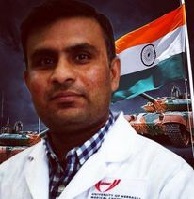
Dr.
Ashok Sharma
Male
Affiliation
Additional Professor
Department of
Biochemistry
Contact
Email :
ashok[dot]sharma[at]aiims[dot]edu
Phone :
91-(11)-2659-3545(off.)
09818665092 (M)
Office Address
Room No-3029, Department of Biochemistry, Posted: National Cancer Institute/AIIMS Jhajjar Campus, Haryana, Bharat (India)
http://scholar.google.com/citations?user=3ac275cAAAAJ&hl=en
http://scholar.google.com/citations?user=3ac275cAAAAJ&hl=en
Dr. Sharma is an Additional Professor in the Department of Biochemistry and Posted in NCI-India/AIIMS Jhajjar Campus, AIIMS, New Delhi.He received Ph.D. in Cancer Biology at the Department of Biochemistry at All India Institute of Medical Sciences (AIIMS), New Delhi, in 2009. He is the recipient of multiple awards, including the prestigious “DBT-Ramalingaswami fellowship” and “DST-Ramanujan fellowship” awards from Govt. of India and “Outstanding Immunologist Award”, Immunocon, Indian Immunologist Society, BHU.
In 2009, he joined the Vanderbilt Medical Center, Vanderbilt University, Nashville, TN USA as a postdoctoral fellow. He worked on tight junction proteins (claudins) and their role in regulating cell migration and epithelial-mesenchymal transition (EMT). In 2012, he joined the group of Adam R Karpf at Eppley Institute, UNMC, as a senior postdoc. He is working on the epigenetics & regulation of Cancer-Testis/germline antigen POTE and its biomarkers/therapeutic potential. He has published multiple research articles and abstracts in national and international journals. He is actively involved in ePG-Pathshala, an MHRD, National Mission on Education through ICT (NME-ICT) venture to develop e-content at the postgraduate level that will help to improve the education system in India. Dr. Sharma has been the principal investigator and co-investigator in multiple projects for gynecological cancer. Dr. Sharma has been actively involved in establishing the “DBT-AIIMS/NCI-India Translational & Clinical Research Partnership Center” as PI with the help of DBT, GOI, and Early Detection Research Network (EDRN) at NCI-India with collaboration with EDRN-NCI-USA.
All India Institute of Medical Sciences (AIIMS), New Delhi, India
| Jun.2005–Jan. 2009 | Senior Research Fellow: Project:Effect of Bleomycin on the Expression of High Mobility Group Proteins in Benzo(a)pyrene Induced Skin Tumour "awarded & funded by Indian Council of Medical Research (ICMR- PHA/BMS/2006). |
| Aug. 2003-May, 2005 | Junior Research Fellow: Project: Studies on Expression of HMGA Chromosomal Proteins In Cancer and Their Interaction with DNA ". Project funded by Department of Science & Technology (DST) (SP/SO/AS-55/2002), India |
| Aug. 2002-July 2003 | Research Assistant: Project: Preferential Binding of Quinolones to DNA with Alternating G, C/A, T Sequences: A Spectroscopic Study" funded by Indian Council of Medical Research (ICMR- 58/4/97-BMS-II). |
Education:
The University of Melbourne, Australia, Jun 2014
Advanced Certificate courses in “Epigenetic Control of Gene Expression."
This course addresses the basic principles of epigenetics, the role of epigenetics in biological phenomena such as imprinting, X-inactivation, cellular identity, cellular reprogramming in several organisms, and a focus on mammals. It also deciphers the interplay between epigenetic control and the environment, the role of aberrant epigenetic mechanisms in human diseases, and finally, the development of epigenetically effective drugs. The program's objective is to provide a solid foundation of information, enabling participants to design experiments when returning to their own research lab.
All India Institute of Medical Sciences (AIIMS), New Delhi, India
Ph.D. Department of Biochemistry, September 2008.
Thesis: Effect of Anticancer Agents on the Expression of High Mobility Group (HMG) Proteins in Skin Cancer”
Examined the mechanism of various anticancer agents like cisplatin, doxorubicin, Bleomycin through the expression of DNA binding high mobility group (HMGs) proteins in benzo(a)pyrene-induced squamous cell carcinoma of the skin.
I used various molecular and biochemical techniques, both In-vitro and In-vivo models, and basic microbiological and biochemical techniques and data corroborate with Magnetic Resonance Imaging in an animal model.
Results help in elucidation of the molecular mechanisms that mediate cisplatin. Doxorubicin resistance holds promise for the design of pharmacological strategies for preventing, overcoming, or reversing this form of drug resistance.
Maharshi Dayanand University, Rohtak, HR, India
Master of Science (M.Sc.) Specialization: Biochemistry, September 2001.
Dissertation: Effect of NaCl Salinity on Oxalate Metabolism in Shoot of Barley during Early Phase of Growth “. Results published in 'India Journal.'
Pt. B.D.S Post Graduate Institute of Medical Sciences, Rohtak, HR, India
- D. Pharmacy, September 1999. Concentration in ’Pharmacology & Toxicology’;Pharmaceutics; Pharmaceutical chemistry; Pharmaceutical Jurisprudence; ‘Drugs store & Business Management’ and ’Hospital & Clinical Pharmacy; along with three months training as an Apprentice Pharmacist in different departments at Pt. B.D. Sharma Post Graduate Institute of Medical Sciences, Rohtak, Haryana. Participated in summer’s research program resulting in dissertation and presentation.
- Dissertation: Anti-dermatitis Potency of Stem Extract of Capparis deciduas
Positions Available:
Highly motivated and interested fellows and students are encouraged to inquire regarding the availability of research positions. We are seeking applications from motivated, goal-oriented individuals with excellent academic backgrounds and having their ownCSIR/DBT/ICMR/BINC/DST fellowships.Candidates with experience in Molecular Biology/Bioinformatics or other multidisciplinary are encouraged to contact and send their CV along with a cover letter at ashok[dot]sharma[at]aiims[dot]edu
Research Focus of the Lab:
Assertive discoveries have been carried out during the past decade to explore the role of epigenetic mechanisms in regulating cellular phenotype. This regulation provides the software that packages DNA, and modifications in gene expression without changing the DNA sequence of a gene. These are called epigenetic alterations. These alterations include methylation, acetylation, phosphorylation, and ubiquitylation of DNA and histone proteins (nucleosomes) as well as chromatin remodeling. "Epigenetics" refers to heritable changes in gene expression patterns without changing the primary DNA sequence. Technological advancements in genome-wide DNA sequencing, RNA sequencing for coding and non-coding expression patterns, DNA methylation and chromatin assay and assessment of all of the above with advanced bioinformatics tools are facilitating to delineate the cancer epigenome and permit key insights for developing personalized therapeutics. Our lab focuses on cancer epigenetics and is trying to decipher the epigenome regulation that may lead to the development of new epigenetic therapeutic drugs. The recent discovery of Cancer Testis/Germline (CT/CG) antigen expression in cancer suggests a strong link between gametogenesis and carcinogenesis.CG antigens can serve as biomarkers for cancer stem cells and potential targets in cancer metastatic processes as well as in the recurrence of cancer after chemotherapy. We are indulging in opening new avenues for novel Cancer Testis/Germline (CT/CG) POTE antigens to be used for cancer immunotherapy for treating gynecological cancer patients for better reproductive health. POTE (Prostate, Placenta, Ovary, and Testis-expressed) is a recently discovered gene family consisting of 14 autosomal and pericentromeric localized cancer-testis/germline antigen genes. The POTE paralogs gene family encodes proteins with cysteine-rich (CRR) domains, ankyrin repeat motifs, and α-helical regions. It is established that epigenetic mechanisms control the expression of CT/CG antigens. Epigenetic modulatory agents robustly promote the expression of CG antigens and the class-1 histocompatibility complex (MHCI).Thus, we emphasize the possible clinical use of epigenetic modulators to augment the immunotherapeutic potential of POTE family antigens and how this will ultimately improve cancer detection and treatment strategies.
Towards the mechanistic part, we are working on chromatin dynamics to be applied for answering key questions of alteration in pericentromeric localized gene expression during cancer. POTEs gene families are localized in pericentromeric regions, where duplicated genes are often abundant. Still, it is unclear how POTE paralogs escape pericentromeric repression and become expressed in cancer. Chromatin has a defined 3-D organization inside the nucleus, which guides gene expression. Although this 3D Genome organization is just recently being defined to the molecular levels, there is much to be answered in this area. Our lab is working to correlate the established molecular mechanisms for gene regulation e.g DNA methylation to be linked to the 3D genome organization inside the nucleus. It is known that there are several repressive compartments inside the nucleus where genes are dynamically located as a whole. Therefore what is the relation of epigenetic gene regulation to the gene localization and arrangement inside the nucleus? This is an inevitable question here. One such repressive compartment is nuclear lamina, where the associated sequences, called "Lamina-associated domains (LADs)" and "pericentromeric-associated domains (PADs)" are dynamically placed. We are trying to find factors responsible for these LADs /PADs formation and regulation to be applied for cancer biology. Altogether this is an entirely new area in the field of cancer biology, and studies are coming up with new fascinating facts; we are trying to be part of these strategies, with an ultimate goal to combat cancer. For further details, please visit "Laboratory of Chromatin and Cancer Epigenetics", the URL of which is at my researchgate profile.
Job/Research Experience:
| July 2021- Present Aug. 2020-June, 2021 | : Additional Professor- Department of Biochemistry, National Cancer Institute, Jhajjar Campus, Haryana : Associate Professor- Posted at National Cancer Institute, Jhajjar Campus, Haryana |
| July 2018- June, 2021 | : Associate Professor- Department of Biochemistry |
| Dec. 2015- Aug 2020 | : Faculty In-Charge, Biochemistry Diagnostic lab |
| Jun 2015 - Jun 2018 | : Assistant Professor- Department of Biochemistry |
| April 2015- Jun 2015 | : DBT-Ramalingaswami Fellow- Dept. of Obstetrics & Gynaecology |
Postdoctoral Experience
| Oct.2012-March 2015 | : Postdoctoral Research Associate - Eppley Institute for Research in Cancer, UNMC, Omaha, Nebraska, USA Project focus: Mechanisms of DNA hypomethylation in ovarian cancer and evaluating its contribution to tumour progression and potential as a biomarker for the disease. ⮚ Understand the role of DNA methylation changes in cancer, with a current emphasis on epithelial ovarian cancer (EOC) ⮚ Understand the role of Lamina Associated Domain (LADs) in genomic instability ⮚ Define the mechanisms leading to activation of Cancer-Germline POTE genes in cancer ⮚ Mechanisms under the current study include DNA methylation, histone modifications, nucleosome positioning, and the interaction of epigenetic factors with transcription factor-driven oncogenic signalling mechanisms. |
| Jan. 2009-Oct. 2012 | : VUMC Research Fellow - Department of Surgical Oncology, Vanderbilt University, Nashville, TN, USA Research focuses on "Elaborate the mechanism underlying the role of claudin 1 as a tumour promoter and metastasis in Colon cancer". ⮚ Epigenetic regulation of claudin 1 expression and role of ELAV family proteins in modulation of mRNA stability. ⮚ Explore the signalling and molecular mechanisms using anoikis as the study model, potentially applying to the in-vivo model of colon cancer metastasis and invasion. ⮚ Determine the role of APC and NOTCH signalling pathway in DSS/AOM induced IBD and cancer in claudin-1 overexpressed transgenic mice ⮚ Elaborating the mechanisms underlying using the different PKC and PKA inhibitors on the novel nuclear localization of claudin-1 in colon metastasis. |
Key Publications (Selected):
http://scholar.google.com/citations?hl=en&user=3ac275cAAAAJ
- Sahar Qazi, Bimal Prasad Jit, Abhishek Das, Muthukumarasamy Karthikeyan, Amit Saxena, M.D. Ray, Angel Ranjan Singh, Khalid Raza, B. Jayaram, Ashok Sharma. BESFA: bioinformatics based evolutionary, structural & functional analysis of prostrate, Placenta, Ovary, Testis, and Embryo (POTE) paralogs. Heliyon, Cell Press. 2022 Sep 5:e10476 (PMID: 36132183)
- Rashmi Gupta, Bimal Prasad Jit, Santosh Kumar, Sandeep Mittan, Pranay Tanwer, M D Ray, Sandeep Mathur, Vanamail Perumal, Lalit Kumar, G K Rath, Ashok Sharma. Leveraging epigenetics to enhance the efficacy of cancer-testis antigen: a potential candidate for immunotherapy. Epigenomics, 2022 Jul;14(14):865-886. (PMID: 35872653)
- Asgar Ansari, Shilpa Sachan, Bimal Prasad Jit, Ashok Sharma, Poonam Coshic, Alessandro Sette, Daniela Weiskopf, Nimesh Gupta. A highly efficient T-cell immunoassay provides assessment of B cell help function of SARS-CoV-2 specific memory CD4+ T cells. Cell Rep Methods. 2022 Jun 20;2(6):100224. doi: 10.1016/j.crmeth.2022.100224. (PMID: 35571764)
- Sibi Raj, Kavindra Kumar Keshari, Arun Kumar, Brijesh Rathi, Ashok Sharma, Piyush Kumar Gupta, Saurab Kumar Jha, Niraj Kumar Jha, Petr Slama, Shubhadeep Roychoudhury, Dhruv Kumar, Molecular mechanism of regulation of c-MET/HGF signaling in head and neck cancer. Molecular Cancer, Jan 26, 2022, 10.1186/s12943-022-01503-1. (Review Article).
- Dublin Lal Gupta, Ashok Sharma, Kapil Dev Soni, Syed Naqui Kazim, Sanjeev Bhoi, Dr. D.N Rao. Changes in the behaviour of monocyte subsets in acute post-traumatic sepsis patients. Mol. Immunol., 2021 Jun 1;136:65-72. (PMID: 34087625)
- Asgar Ansari, Rakesh Arya, Shilpa Sachan, Someshwar Nath Jha, Anurag Kalia, Anupam Lall, Alessandro Sette, Alba Grifoni, Daniela Weiskopf, Poonam Coshic, Ashok Sharma, Nimesh Gupta. Immune memory in mild COVID-19 patients and unexposed donors reveals persistent T cell responses after SARS-CoV-2 infection. Front. Immunol. 2021 Mar 11; 12:636768. (PMID: 33777028)
- Bimal Prasad Jit, Sahar Qazi, Rakesh Arya, Ankit Srivastava, Nimesh Gupta & Ashok Sharma*. An immune epigenetic insight to COVID-19 infection. Epigenomics (2021) Mar;13(6):465-480. (PMID: 33685230)
- Subhadip Kundu, M.D Ray and Ashok Sharma*. The interplay between Genome organization and Epigenomic alterations of Pericentromeric DNA in Cancer. J. Genet. Genomics, (2021), Mar 6;S1673-8527 (PMID: 33840602)
- Mann M, Kumar S, Chauhan SS, Gupta R, Ashok Sharma, Kumar L*. PARP-1 inhibitor modulates β-catenin signaling to enhance cisplatin sensitivity in the cancer cervix. Oncotarget. 2019 Jul 30;10(46):4802. (PMID: 31413820) (*Co-Corresponding Author)
- Yogindra S Abhyankar, Rajesh Harsh, Rajendra Badwe, GK Rath, Siddhartha Laskar, Bruce Faddegon, Joseph Perl, Harald Paganetti, Jan Schuemann, Ashok Sharma, Jeffrey Buchsbaum. Monte Carlo Processing on a Chip (MCoaC)-preliminary experiments toward the realization of optimal-hardware for TOPAS/Geant4 to drive discovery. Physica Medica.2019, July 64:166-173 (PMID:31515016)
- Ashok Sharma, Mustafa Albahrni et al. Epigenetics activation of POTE genes in ovarian cancer. Epigenetics. 2019 Feb 14. (PMID: 30764732)
- Carter Barger, Wa Zhang, Ashok Sharma, Linda Chee, Smitha James, Christina Kufel, Austin Miller, Ronny Drapkin, Kunle Odunsi, David Klinkebiel, and Adam Karpf. Expression of the POTE gene family in human ovarian cancer. Sci Rep. 2018 Nov 20;8(1):17136. (PMID: 30459449)
- Smitha R. James, Carlos Cedeno, Ashok Sharma, Wa Zhang, James L. Mohler, Kunle Odunsi. Elizabeth M. Wilson and Adam R. Karpf. DNA methylation and nucleosome occupancy regulate MAGEA11 expression in human cancer. Epigenetics, 2013. July, 8(8).(PMID: 23839233)
- Ashok Sharma, Moorthy Krishnan Amar B. Singh, Punita Dhawan*. Trichostatin-A Modulates Claudin-1 mRNA Stability Through the Modulation of HuR and Tristetraprolin in Colon Cancer Cells. Carcinogenesis 2013 Jul 23. (PMID: 23880304)
- Jillian L. Pope, Ajaz. A. Bhat, Ashok Sharma, Rizwan Ahmad, Mary K. Washington, Robert D. Beauchamp, Amar B. Singhand Punita Dhawan. Claudin-1 Regulates Intestinal Epithelial Homeostasis through the Modulation of Notch Signaling. GUT, 2013 (PMID: 23766441)
- Ashok Sharma, Singh AB, Dhawan P. Claudin-1 Expression Confers Resistance to Anoikis in Colon Cancer Cells in an Src-dependent Manner. Carcinogenesis. 2012. Dec; 33(12): 2538-47. (PMID: 22941059)
- Ashok Sharma, Singh AB, Krishnan M, Smith JJ, Beauchamp RD, Dhawan P. Claudin-1 regulates E-cadherin expression through ZEB-1/TCF-8/dEF-1 in Colon Cancer Cells. Gastroenterology, 2011. Dec; 141(6): 2140-53. (PMID: 21878201)
- Krishnan M, Singh AB, Smith JJ, Ashok Sharma, Chen X, Eschrich S, Yeatman TJ, Beauchamp RD, Dhawan P. HDAC inhibitors regulate claudin-1 expression in colon cancer cells through modulation of mRNA stability. Oncogene. 2010 Jan 14; 29(2): 305-12. (PMID: 19881542)
- Ashok Sharma, Ramanjaneyulu A, Ray R, Rajeswari MR. Involvement of High Mobility Group B Proteins in Cisplatin-induced Cytotoxicity in Squamous Cell Carcinoma of Skin. DNA Cell Biol. 2009 Jul; 28(7): 311-318. (PMID: 19435426)
- Rajesh Vikkurthi, Asgar Ansari, Anupama R. Pai, Someshwar Nath Jha, Shilpa Sachan, Suvechchha Pandit, Bhushan Nikam, Anurag Kalia, Bimal Prasad Jit, Hilal Ahmad Parray, Savita Singh, Pallavi Kshetrapal, Nitya Wadhwa, Tripti Shrivastava, Poonam Coshic, Suresh Kumar, Pragya Sharma, Nandini Sharma, Juhi Taneja, Anil K. Pandey, Ashok Sharma, Ramachandran Thiruvengadam, Alba Grifoni, Daniela Weiskopf, Alessandro Sette, Shinjini Bhatnagar and Nimesh Gupta. Inactivated whole-virion vaccine BBV152/Covaxin elicits robust cellular immune memory to SARS-CoV-2 and variants of concern. Nat Microbiol. 2022 Jun 9. doi: 10.1038/s41564-022-01161-5 (PMID: 35681012)
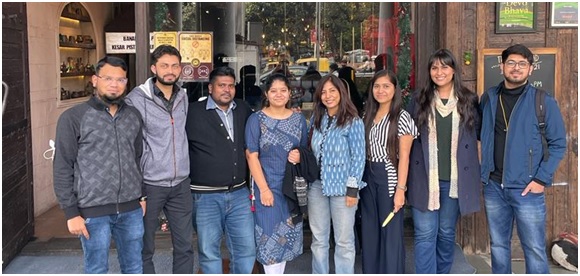
Dr.
Archana Singh
Female
Affiliation
Additional Professor
Department of
Biochemistry
Contact
Email :
archanasinghaiims[at]gmail[dot]com
Office Address
Address: Room no. 3022, Dept. of Biochemistry, III floor, Teaching Block, AIIMS, Ansari Nagar, Delhi
Left to right: Dr.Shaikh Abdul Mubeen, Deepak Vats, Diravyaseelan M, Hema Yadav,Dr. Archana Singh, Dr. Sudhasini Panda, Alisha Arora, Faisal Shah
Academic Details:
| Degree | Subject | University/ Institution | Year |
|---|---|---|---|
| M.B.B.S. | Bachelor of Medicine and Surgery | Maulana Azad Medical College, Delhi University | 1998-2003 |
| M.D. | Biochemistry | Lady Hardinge Medical College, Delhi University | 2005-2008 |
Positions held:
| Position | Department | University/ Institution | Dates |
|---|---|---|---|
| Senior Resident | Biochemistry | Lady Hardinge Medical College | 27 May 2008 - 30 Dec 2009 |
| Assistant Professor | Biochemistry | University College of Medical Sciences | 31 Dec 2009 - 13 June 2014 |
| Assistant Professor | Biochemistry | All India Institute of Medical Sciences | 14 June 2014 – 30 June 2017 |
| Associate Professor | Biochemistry | All India Institute of Medical Sciences | 1 July 2017 – 30 June 2020 |
| Additional Professor | Biochemistry | All India Institute of Medical Sciences | 1 July 2020- till date |
Notable Awards and Society Memberships
Life member of the Association of the Medical Biochemist of India (AMBI), Association of the Clinical Biochemists of India (ACBI), Indian Society for Atherosclerosis Research (ISAR), Indian Immunology Society
- Executive Member of Indian Immunology society National body (2016-2022)
- Joint Secretary of Indian Immunology Society National body(2022- 2024)
- Trained on medical laboratories quality management system and Internal audit as per IS/ISO 15189 from National Institute of training for standardization, Bureau of Indian Standards, Noida, Delhi.
- Worked on various aspects of complicated pregnancy (Pre-eclampsia and IUGR) and has won three awards namely Dr. C Sita Devi Award for best paper twice at Association of Clinical biochemists of India in 2010 and 2013 and International Federation of Clinical Chemistry Roche Travel Scholarship to attend and present poster at Asian Pacific Federation of Clinical Biochemistry 2013, Bali, Indonesia.
- At present working in tuberculosis has got few awards won by Sudhasini Panda (PhD student) and Dr Ambrish Tiwari (MD student) which are as follows: Travel award to present paper at APFCB 2016, best paper at ACBI Delhi chapter 2016 and Dr P Usha Sharma best paper at ACBICON 2017. Won third price for AIIMS excellence Research Award 2019
Others
Involved as co-Investigator and Co-guide in other interdepartmental Extramural and Intramural projects and DM/Mch/PhD/MD/MS/MSc/MBBS thesis and research work.
Lab members (Current)
- Ms. Alisha Arora (PhD student)
- Mr. Deepak Vats (PhD student)
- Ms. Vidushi Sharma (MSc student)
- Dr. Shaikh Abdul Mubeen (Junior Resident)
- Mrs. Purnima Gola (Senior Laboratory Technologist)
- Karan (Lab Assistant)
Lab members (Alumni)
- Ambrish Tiwari (MD)
- Dr. Sudhasini Panda (PhD and MSc)

Current Affiliation: Postdoctoral fellow, La Jolla Institute for Immunology, San Diego, California
3, Dr. Diravyaseelan M (M.D)
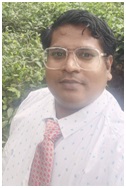
Current Affiliation: Senior Resident, Department of Biochemistry, AIIMS, Delhi
4 Mr. Faisal Shah (MSc)
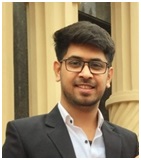
Current Affiliation: PhD Scholar, Friedrich-Loeffler-Institute, University of Griefswald, Griefswald, Germany
5 Ms. Hema Yadav (MSc)
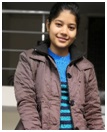
Current Affiliation: PhD Scholar, Department of Biochemistry, AIIMS, Delhi
Interested in taking JRF/research trainees/ MBBS summer fellows as and when funds are available
Patient Care: Presently In - charge of clinical chemistry laboratory, Department of Biochemistry, All India Institute of Medical Sciences, Delhi. Is also in charge for porphyria testing in the department.
Students presently working in Laboratory
- Ms. Alisha Arora (PhD student)
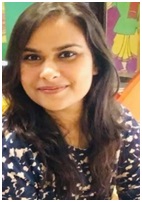
Alisha completed her B.Sc.(H) in Zoology from Daulat Ram College, University of Delhi in 2017. She has completed her M.Sc. in Zoology from Hansraj College, University of Delhi in 2019. She qualified CSIR-UGC-JRF in 2017. Currently she is a third year PhD student under the guidance of Dr. Archana Singh. She is working on “Influence of different grades of hyperglycemia on innate immune responses in pathophysiology of active tuberculosis
2. Mr. Deepak Vats (PhD student)
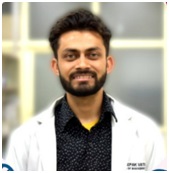
Deepak completed his B.Sc. (H) in Zoology from Panjab University in 2017. He did his M.Sc. in Zoology from CCS Haryana Agricultural University in 2019. He qualified CSIR-NET-JRF in December 2020. Currently he is a second year PhD student under the guidance of Dr. Archana Singh. His PhD thesis is on “Study of immune response in TST (Tuberculin Skin Test) and IGRA (Interferon Gamma Release Assay) negative household contacts compared to latent TB infected household contacts of adult pulmonary tuberculosis patients
3. Ms. Vidushi Sharma (MSc student)
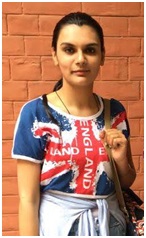
Vidushi completed her B.Sc.(H) in Biochemistry from Sri Venkateswara College, University of Delhi in 2021. She is the Delhi University Gold Medalist in the year 2021 for securing the highest marks in the B.Sc. (H) Biochemistry examinations. She had secured an All India Rank 1 in both AIIMS Biochemistry and Biotechnology entrance exams. She qualified GATE 2022 in both Biotechnology and Life Science. She is a first year M.Sc student and under the supervision of Dr. Archana Singh, she is working on her thesis titled “Study of Bdellovibrio bacteriovorus as a live antibiotic against Mycobacterium tuberculosis.”
4. Dr. Shaikh Abdul Mubeen (Junior Resident)
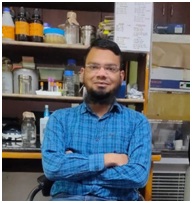
Dr. Mubeen did his MBBS from Government Medical College and Hospital, Aurangabad. Currently he is the first year M.D. student under the guidance of Dr. Archana Singh. His thesis is focused on the “Study of Immunophenotypes of monocyte subsets in TST and IGRA negative household contacts of adult pulmonary Tuberculosis Patients.”
Research Focus of the Lab
We have worked on the genetics and immunology of pre-eclampsia and intra uterine growth restriction. We are developing new treatment modalities with respect to nitric oxide. We have published about seven original studies so far on this aspect. Her work on various aspect of complicated pregnancy has won three awards as mentioned above.
We are elucidating the biochemical, genetic and immunological host factors of tuberculosis in understanding disease pathophysiology and development of diagnostic biomarkers for identification of latent TB among household contacts. For the last seven years, we have been actively working on understanding the host factors like vitamin D, nitric oxide and iron regulatory proteins that could influence the pathophysiology of pulmonary tuberculosis (TB) with respect to the latency of infection by studying closed household contacts of TB patients. We have completed one SERB funded project “Study of vitamin D receptor (VDR) and cathelicidin expression and their correlation with Fok1 VDR polymorphism in Tuberculosis” and established a cohort of 200 pulmonary TB patients and their household contacts studying these host factors which was published as three independent research articles (Scientific Reports 2019, J Steroid Biochem Mol Biol 2019 and Ind J Clin Biochem 2021).
We are also working on the adaptive immune responses and the genetic correlates in the household contacts of active pulmonary TB patients. It would be interesting to understand why some of the household contacts do not develop tuberculosis and what are the immunological basis for the same. Thus, the findings will add bulk to the global scientific library of tuberculosis regarding the same.
We are also interested in understanding why diabetic individuals are more prone to develop tuberculosis and are studying the role of macrophage effector function in hyperglycemia to understand the same. The article regarding this work has got recently accepted for publication in the European Journal of Immunology.
We are exploring various adjunct therapies for tuberculosis treatment.
Research Projects:
Tuberculosis
- Study of immune response in TST (Tuberculin Skin Test) and IGRA (Interferon Gamma Release Assay) negative household contacts compared to latent TB infected household contacts of adult pulmonary tuberculosis patients (Science and Engineering Research Board- 2022-2025, ongoing) (PI, PhD thesis)
- Study of Immunophenotypes of monocyte subsets in TST and IGRA negative household contacts of adult pulmonary Tuberculosis (ICMR Financial support for MD thesis-2021, ongoing) (M.D. thesis Supervisor)
- Study of effect of hyperglycemia on phenotypic and functional alteration in differentiated macrophages from THP1 cell line and monocytes from pulmonary tuberculosis patients (ICMR-2019 to 2022, ongoing) (PI, PhD thesis)
- Study of Mycobacterium indicus pranii and human beta defensin 2 as adjunct and chemoimmunotherapy against Mycobacterium tuberculosis in vitro (IMRG-2019-2021, completed) (PI, M.Sc. thesis)
- Study of hyperglycemia on macrophage effector function in pathophysiology of pulmonary tuberculosis (Science and Engineering Research Board-2018-2021, completed) (PI, PhD thesis)
- To study the expression of nitric oxide and inducible nitric oxide synthase (iNOS) and their correlation with iNOS gene polymorphic variants in tuberculosis patients and controls (ICMR PG thesis grant, completed) (M.D. thesis Supervisor)
- Study of vitamin D receptor (VDR) and Cathelicidin expression and their correlation with Fok I polymorphism in tuberculosis (PI, Science and engineering Research board, DST YSS extramural grant-2015-2018, completed) (PI, M.Sc thesis)
- Serum hepcidin levels: Correlation with ferroportin expression and localization and thus iron export in pathophysiology of pulmonary tuberculosis (IMRG-2017-2018, completed) (PI, M.Sc. thesis)
- Expression of Vitamin D Binding Protein (VDBP) and plasma concentration of Vitamin D in pulmonary tuberculosis (STS ICMR-2016, completed) (Supervisor STS)
- TB association of India (short grant, received twice)
Publications
* Communicating Author
- Archana Singh*, Deepika Sharma, Chitra Raghunandan, Jayashree Bhattacharjee. “Role of inflammatory cytokines and eNOS gene Polymorphism in pathophysiology of pre-eclampsia” . American Journal of Reproductive Immunology 2010 ; 63 (3):244-25
- Deepika Sharma, Archana Singh, Shubha S. Trivedi, Jayashree Bhattacharjee “Role of Endothelin and Inflammatory Cytokines in Pre-eclampsia – A Pilot North Indian Study ” .American Journal of Reproductive Immunology 2010 ; 65(4):428-32.
- Tanuj Chawla, Deepika Sharma, Archana Singh* “Role of the renin angiotensin system in diabetic nephropathy”. World J Diabetes. 2010 ; 1(5): 141-145.
- Deepika Sharma, Parul Goyal, Archana Singh, Shubha S. Trivedi, Jayashree Bhattacharjee. “Intergenotypic variation of oxidative stress marker of eNOS (Glu298Asp) gene polymorphism in preeclampsia”.Anatolian Journal of Obstetrics & Gynecology 2010 ; 3:2 : ISSN 1308-8254
- Deepika Sharma, Archana Singh, Shubha S. Trivedi, Jayashree Bhattacharjee. Intergenotypic Variation of Nitric Oxide and Inflammatory Markers in Preeclampsia in North Indian Population. Human Immunology 2011 ;72 (5): 436-439
- Deepika Sharma, S. A. Hussain, N Akhter, Archana Singh, Shubha S. Trivedi, Jayashree Bhattacharjee. Endothelial nitric oxide synthase (eNOS) gene Glu298Asp polymorphism and expression in North Indian preeclamptic women. Pregnancy Hypertension: An International Journal of Women’s Cardiovascular Health 2013; 4(1): 65-69
- Siddhamsetty AK, Verma SK, Kohli A, Verma A, Puri D, Singh A. Exploring time of death from potassium, sodium, chloride, glucose & calcium analysis of postmortem synovial fluid in semi-arid climate. Journal of forensic legal medicine. Nov 2014; 28: 11-4.
- Archana Singh*, Chitra Raghunandan and Jayashree Bhattacharjee. Endothelin: link between the primary placental causes and the secondary systemic endothelial dysfunction in pathophysiology of pre-eclampsia.Obstetrics and Gynecology International Journal. June 2015; 2(3): online
- Shalini Singh, Archana Singh*, Deepika Sharma, Abha Singh, M. K. Narula and Jayashree Bhattacharjee. Effect of L-Arginine on Nitric Oxide Levels in Intrauterine Growth Restriction and its Correlation with Fetal Outcome. Indian Journal of Clinical Biochemistry. July 2015; 30(3): 298-304.
- Ashok Kumar Ahirwar, Anju Jain, Archana Singh, Binita Goswami, M K Bhatnagar and Jayashree Bhattacharjee. The study of markers of endothelial dysfunction in metabolic syndrome. Horm mol Biol Clin Invest Dec 2015; 24(3):131-6.
- Ahirwar AK, Singh A, Jain A, Patra SK, Goswami B, Bhatnagar MK, Bhatacharjee J. Raised TSH is associated with endothelial dysfunction in Metabolic Syndrome: A case control study. Romanian Journal of Internal Medicine. June 2017, 55(4):212-221
- AK Ahirwar, A Singh, A Jain, SK Patra, B Goswami, MK Bhatnagar and J Bhattacharjee. Role of Sub Clinical Hypothyroidism in Association with Adiponectin Levels Causing Insulin Resistance in Metabolic Syndrome: A Case Control Study. The Tokai journal of experimental and clinical medicine. July 2017; 42 (2): 96-103.
- Ahirwar AK, Singh A, Jain A, Kaim K, Bhardwaj S, Patra SK, Goswami B, Bhatnagar MK, Bhattacharjee J. Association of prothrombotic adipokine (plasminogen activator inhibitor-1) with TSH in metabolic syndrome: a case control study. Horm Mol Biol Clin Investig. 2017 Dec 20;34(1).
- Sudhasini Panda, Ambrish Tiwari, Kalpana Luthra, S. K. Sharma & Archana Singh* Association of Fok1 VDR polymorphism with Vitamin D and its associated molecules in pulmonary tuberculosis patients and their household contacts. Sci Rep 9, 15251 (2019)
- Sudhasini Panda, Ambrish Tiwari, Kalpana Luthra, S. K. Sharma & Archana Singh* Status of vitamin D and the associated host factors in pulmonary tuberculosis patients and their household contacts: A cross sectional study. The Journal of Steroid Biochemistry and Molecular Biology [27 Jun 2019, 193:105419]
- Abhishek Gupta, Veereshwar Bhatnagar, Anjan Kumar Dhua, Manisha Jana, Archana Singh, Rohan Malik. Correlation of Hepatic Artery Resistive Index with Portal Pressure and Serum Nitric Oxide Levels in Patients with Extrahepatic Portal Vein Obstruction. J Indian Assoc Pediatr Surg. 2020 Jan-Feb; 25(1): 38–42. PMC6910058
- Shashi Kant, Ravneet Kaur, Farhad Ahamed, Archana Singh, Sumit Malhotra, Rakesh Kumar. Effectiveness of intravenous ferric carboxymaltose in improving hemoglobin level among postpartum women with moderate-to-severe anemia at a secondary care hospital in Faridabad, Haryana – An interventional study.
- Archana Singh*, Sudhasini Panda, Diravyaseelan M, et al. Role of hyperglycemia on macrophage effector function in pathophysiology of pulmonary tuberculosis. BMC Infectious Diseases, May 20, 2020, 20(suppl 1):324
- Archana Singh*, Sudhasini Panda, Ambrish Tiwari, Kalpana Luthra, S K Sharma. Vitamin D modulates innate immunity in pulmonary tuberculosis. The Journal of Immunology, May 1,2020,204 (1 supplement) 227.3
- Sudhasini Panda, Shah Faisal, Krishna Kumar, Diravya M. Seelan, Alpana Sharma, Neeraj Kumar Gupta, Sudip Datta & Archana Singh*. Role of Regulatory Proteins Involved in Iron Homeostasis in Pulmonary Tuberculosis Patients and Their Household Contacts. Ind J Clin Biochem, 6 Jan 2021. https://doi.org/10.1007/s12291-020-00947-w
- Yadav H, Irugu D, Ramakrishanan L, Singh A, Abraham R, Sikka K, Thakar A, Verma H. An evaluation of serum Otolin-1 & Vitamin-D in benign paroxysmal positional vertigo. Journal of Vestibular Research: Equilibrium & Orientation, 06 Mar 2021,DOI: 10.3233/ves-201601 PMID: 33720865
- Ravneet Kaur, Shashi Kant, Partha Haldar, Farhad Ahamed, Archana Singh, Vignesh Dwarakanathan, Sumit Malhotra, Kapil Yadav .Single dose of IV Ferric Carboxy Maltose (FCM) prevents anemia for six months among moderately or severely anemic postpartum women: a case study from India" has been accepted for publication in Current Developments in Nutrition(CDN). Accepted M
- Sudhasini Panda, Diravya M Seelan, Shah Faisal, Alisha Arora, Kalpana Luthra, Jayanth Kumar Palanichamy, Anant Mohan, Naval K Vikram, Neeraj Kumar Gupta, Lakshmy Ramakrishnan, Archana Singh*. Chronic hyperglycemia drives alterations in macrophage effector function in pulmonary tuberculosis. European Journal of Immunology (under publication-Accepted)

Dr.
Subhradip Karmakar
Male
Affiliation
Additional Professor
Department of
Biochemistry
Contact
Email :
subhradipaiims[at]gmail[dot]com
Phone :
91-11-2659 4027
Office Address
Address: Room No. 3020, Department of Biochemistry, Third Floor, Teaching Block, AIIMS, New Delhi
ACADEMIC PROFILES:
PROFESSIONAL CAREER:
| Position held | Department | University/Institution | Duration |
|---|---|---|---|
| Additional Professor | Biochemistry | AIIMS, New Delhi | 2020 onwards |
| Associate Professor | Biochemistry | AIIMS, New Delhi | 2017 to 2020 |
| Assistant Professor | Biochemistry | AIIMS, New Delhi | 2014 to 2017 |
| Staff Scientist | Hem & Oncology | University of Chicago, USA | 2011 to 2014 |
| Research Associate | Geno & Sys Biology | University of Chicago, USA | 2009 to 2011 |
| Sr Post Doc | Genetics | Yale University | 2005 to 2009 |
ACADEMIC PROFILE:
| Degree | Department | University/Institution | Year | Remarks |
|---|---|---|---|---|
| PhD | Biochemistry | AIIMS, New Delhi | 2004 | Best Postgraduate in Clinical research |
| MSc | Medical Biochemistry | JIPMER, Pondicherry | 1998 | Honour of Merit for University 1st Rank in Masters |
| BSc (Hons.) | Chemistry | Calcutta University | 1995 |
NOTABLE AWARDS:
- Best Poster Award, WCC 2018, Jaipur, India
- Best Poster presentation award, Drug Discovery and Development India 2015
- Second best poster award, Globin Switching meeting Asilomar CA 2008
- Indian National Science Academy (INSA) young scientist award (2005) (Highest level national award for young scientist)
- Best Postgraduate in Clinical research award in PhD, 2004
- Best Oral presentation award, Indian Immunology Society meeting (2001)
- Honour of Merit for University 1st Rank in Masters (MSc)
- Endowment Award in MSc for best overall performance
- Best Postgraduate Alumni Award (1995-1998) in Dept of Biochemistry, JIPMER, India
- Qualified (1998,1999) {CSIR National Level Merit Exam for PhD fellowship}
- Qualified for the state level lectureship examination for universities
- Journal of Biomedical Sciences
- Journal of Single Cell Biology (Omics publication group)
- Annals of Clinical and Laboratory Research
- BMC Bioinformatics
- Journal of Clinical Pathology
- Journal of Molecular Cell Biology
- Chinese J of Cancer Research
- Journal of Cancer Research and Therapeutics
- Willey Science Advisor
- Asian K Medical Science
- Oncology Letters
- J Med Archives
- 1JMMD
- PLoS One
- World J of Surgical Oncology
- Asian J of Reproductive Medicine
- F1000
EDITORIAL ASSIGNMENTS:
LABORATORY PERSONNEL:
PhD scholars
| Sl. No. | Personnel | Date of registration | Research area |
|---|---|---|---|
| Sl. No. | Personnel | Date of registration | Research area |
| 1 | Tryambak P. Srivastava | 31-03-2018 | Breast Cancer |
| 2 | Sunil Singh | 13-11-2018 | Placental Biology |
| 3 | Dr. Sajib Kumar Sarkar | 14-11-2018 | Gall Bladder Cancer |
| 4 | Neha Kashyap | 24-06-2021 | Placental Biology |
MSc Student
| Sl. No. | Personnel | Date of registration | Research area |
|---|---|---|---|
| 5 | Lavanya Gupta | 08-09-2021 | Placental Biology |
Post Doc Fellows
| Sl. No. | Personnel | Date of registration | Research area |
|---|---|---|---|
| 6 | Dr. Arnab Nayek | Bioinformatics | |
| 7 | Dr. Joyeeta Talukdar | Cancer Biology | |
| 8 | Dr. Rashmi | Patient derived tumor organoid cultures | |
| 9 | Dr. Isha Goel | Bioinformatics |
Project Fellows
| Sl. No. | Personnel | Research area |
|---|---|---|
| 10 | Indrani Mukherjee | Placental Biology |
| 11 | Abhibroto Karmakar | Autoimmune disorders |
| 12 | Swati Ajmeriya | Bioinformatics |
| 13 | Aman Saifi | Renal cell carcinoma |
Lab technicians
| Sl. No. | Personnel | Research area |
|---|---|---|
| 14 | Vivak Kumar | Documentation and laboratory assistance |
| 15 | Deepak Kumar | Laboratory assistance |
Tryambak is a final-year PhD scholar in Dr. Karmakar’s laboratory. He is working on elucidating the role of the Androgen Receptor in the pathogenesis of Breast Cancer. This prospective study is carried out simultaneously in cell lines and the subjects with breast cancer undergoing surgical interventions at AIIMS, New Delhi. His doctoral research is assisted by a group of basic scientists, pathologists, surgeons; medical, surgical, and laboratory oncologists. He remains grateful to the generous funding support from the ICMR, DHR, and SERB for laboratory funding and CSIR-UGC in terms of senior research fellowship.
Tryambak obtained his B.Sc. B.Ed. dual degrees from the Regional Institute of Education, Bhubaneswar, a constituent unit of NCERT, New Delhi. Following his graduation, he joined South Asian University (SAU), New Delhi for an M.Sc. in Biotechnology. In his masters’ dissertation, he checked the efficacy of a Pfizer drug against the HIV-1 subtype C.
Tryambak advocates open access to knowledge and information. An amateur linguist, he communicates his science, blogs, and thoughts on his website and Twitter. His profile, contact information, and other relevant details can be fetched from his website.
Sunil Kumar
Mr. Sunil Singh has completed his Bachelor’s in 2015 from Deshbandhu College, University of Delhi, New Delhi. After B.Sc. he joined All India Institute of Medical Sciences (AIIMS), New Delhi as master’s Student and completed it in 2017. During M.Sc. he did his thesis under the mentorship of Dr. Subhradip Karmakar on the “Role of Peroxisome Proliferator Activated Receptor alpha (PPAR-α) in Human Trophoblast Invasion”. In 2018 he joined Dr. Subhradip Karmakar, Asst. Professor, Dept. of Biochemistry, AIIMS, New Delhi as PhD student and has started his work on understanding the role of toxic pollutants such as Sulphur dioxide and Particulate matter on the trophoblast cells and thus pregnancy and placentation. A part of his research work also warrants to identify the
transgenerational effect of these pollutants on the fetal health and growth which would be achieved by performing RNA-Seq and ChIP-Seq followed by depth in-silico analysis and animal experiments.
Dr Sajib Kumar Sarkar
Dr Sajib Kumar Sarkar (MBBS, MD, DNB) is a 4th year PhD scholar with Dr Karmakar. He did his MD in Biochemistry from MAMC, New Delhi. As a part of MD thesis he worked on in vitro and animal models of insulin resistance and observed the ameliorating effect of extract of Jamun (Syzigium cumini) seed. He completed 3 years of Senior Residency from department of Biochemistry, AIIMS, New Delhi. Presently he is exploring the molecular pathogenesis of gallbladder cancer with special focus on nuclear receptors.
Neha Kashyap
Ms. Neha Kashyap, first year Ph.D. Scholar has completed her Bachelors in Zoology Honours from “Ravenshaw University” Cuttack, Odisha. She has done her Masters in Life Sciences (Specialization in Biochemistry) from Central University of Punjab, Bhatinda. Her M.Sc. dissertation work was on the topic "miRNA mediated pathway modulation by phytochemicals: An In-silico approach" under the guidance of Dr. Shashank Kumar, Assistant Professor in the Department of Biochemistry. She got selected for the Indian Academy of Sciences “Summer Research Fellowship” project sponsored by the Indian Academy of Sciences, Bengaluru, during her graduation where she worked on the project "Analysis of Phytochemical constituents and amino acids present in green
seaweeds from South East Coast of India” under Dr.George Seghal Kiran,Assistant Professor in Pondicherry University. Later, she worked as a Junior Research Fellow (JRF) in Structural Parasitology lab, International Centre for Genetic Engineering and Biotechnology (I.C.G.E.B), New Delhi under eminent Principal Scientist Dr. Amit Sharma, Director of ICMR-NIMR in the Project "Development and validation of Hyponozite biomarkers for detecting Plasmodium vivax infection" .She also worked there on “Malarial culture and parasite proteins crystallography” .She qualified for ICMR-JRF 2020. Currently, she is working as a Ph.D. Scholar, under Dr. Subhradip Karmakar, Additional Professor in the Department of Biochemistry in All India Institute of Medical Sciences (AIIMS), New Delhi. She is working with the placenta group. Her tentative thesis is " Molecular insights into the chromatin dynamics and epigenetic changes during trophoblast fusion.”.
Lavanya Gupta
Ms Lavanya Gupta has completed her Bachelors from Sri Venkateswara College, University of Delhi in the year 2018-2021. She has done a summer internship project on “Applications of Bioinformatics in Cardiovascular Disorders for Novel Therapeutics Design under ”SRI VENKATESWARA INTERNSHIP PROGRAM FOR RESEARCH IN
ACADEMICS(SRI-VIPRA 2020) “ which included: Identification of target receptors implicated in cardiovascular diseases , compilation of ligand libraries ,Study of ADMET properties for drug-likeness and Virtual screening by docking followed by evaluation of docking energy to find best hit. She has done ADD ON COURSE -
1) “The Science of Stem cells “
2) "Fundamentals of Immunology: Innate Immunity and B-Cell Function"
3) "Understanding the Brain: The Neurobiology of Everyday Life An online course authorized by American Museum.
She was also involved in drug and development project (VISTAAR) , a science Popularisation Event organised by SVC .
Also, she was a part of mindspar ideathon event organised in Sri Venkateswara college, where she was awarded with the best presentation.
Currently, she is working as a Msc student, under Dr. Subhradip Karmakar, Additional Professor in the Department of Biochemistry in All India Institute of Medical Sciences (AIIMS), New Delhi. She is working with the placenta group. Her tentative thesis is "To study the role of estrogen regulated miRNA involved in the process of Human
Dr. Arnab Nayek
Dr. Arnab is working as a Research Associate (Bioinformatician), in the department of Biochemistry, All India Institute of Medical Sciences, New Delhi, under the guidance of Dr. Subhradip Karmakar, Additional Professor, Department of Biochemistry. He is associated with the transcriptomics (RNA-seq) data analysis from RNA sequencing data generated from the lab as well as publicly available data from the The Cancer Genome Atlas (TCGA) database, development of integrated pipelines for NGS data analysis etc. His research credentials supported with 13 publications in referred journals and his research interest includes Next generation sequencing (NGS) data analysis from human samples to improve the disease diagnosis for clinicians, development of integrated pipelines for
NGS data analysis, protein structure modelling, protein engineering, Molecular dynamics simulations.
Dr. Joyeeta Talukdar
Dr. Rashmi
Works on Cancer Research Related to Understand the Altruistic Mechanism and Metastasis. My focus is to understand the mechanism of cancer recurrence, and the complex biological systems that underlie its development. Further, if possible to identify new ways of treating the disease by taking a close-up look at the fundamental mechanisms at work within cells.
Dr. Rashmi Minocha has completed her Ph.D. in Biochemistry from the Ludwig Maximilian University of Munich (LMU), Germany. During the course of her Ph.D., she carried out her research work at the Gene Center, LMU Munich and at the Institute of Biochemistry, University of Gießen (Germany). The overall aim of her doctoral work was to understand how gene expression is regulated by the cross communication between its single steps using yeast as a model organism. Specifically, she worked on the biochemical and functional characterization of splicing proteins Mud2 and Prp19 complex (Prp19C).
After her Ph.D., she moved back to India and joined All India Institute
of Medical Sciences (AIIMS) in the Department of Biochemistry to pursue her interests in medical and health-based research. She is presently working as a Young Scientist Awardee (a fellowship and research grant funded by Department of Health Research). Her major research interests are:
- Establishment of three-dimensional spheroid and organoid culture systems as in vitro disease models.
- Using these pivotal model systems for understanding cancer pathogenesis, screening for potential drugs and investigating new strategies in the field of personalized medicine.
- Applying an interdisciplinary approach by using a combination of techniques from cancer biology, molecular biology, biochemistry and bioinformatics.
Her on-going focus is to apply these 3D culture systems to investigate into the molecular mechanisms which drive gallbladder carcinogenesis.
Indrani Mukherjee
Ms. Indrani Mukherjee completed her Bachelor’s degree from Bethune College, Kolkata, the oldest women’s college in Asia with first division in Zoology. She pursued her Master’s degree in Zoology with first class from Asutosh College, University of Calcutta. Ms. Indrani completed her research training during M.Sc on the “Role of nanocapsulated flavonoidal antioxidants in combating age related cerebral ischemia-reperfusion (CIR) induced oxidative injury in rat brain” under the guidance of Dr. Nirmalendu Das, Emeritus Scientist, CSIR-Indian Institute of Chemical Biology, Kolkata. She formulated nano-encapsulated antioxidants and applied them orally to Sprague Dawley rats as a pre-treatment prior to CIR insult. She studied the rat brains for histological examinations and
expression of cellular apoptotic factors. Later, she worked under the guidance of Dr. Parasuraman Jaisankar, Senior Principal Scientist, CSIR-Indian Institute of Chemical Biology, Kolkata, in two projects. One project was entitled “A molecular docking approach to study the possible interactions between Yeast 1,4-α glucosidase and some synthetic inhibitors” where she used molecular docking to analyse the interactions between various proteins and their ligands. The second project was entitled “Isolation of enzymes from natural resources” where she used column chromatography, thin layer chromatography and HPLC for the extraction and chemical purification of phosphatases from natural resources. Ms. Indrani then worked as a Project Fellow under the guidance of Dr. Shantanu Chowdhury, Senior Principal Scientist, Functional Genomics, CSIR-Institute of Genomics and Integrative Biology, New Delhi. She focussed on learning the basic molecular biology techniques. She was involved in the amplification of pGL3 basic vector in Stbl2 strain of E.coli and its transient transfection and analysis of protein expression profile in HT 1080 cells. Currently, she is working as a PhD student under the guidance of Dr. Subhradip Karmakar, Additional Professor, Department of Biochemistry, All India Institute of Medical Sciences, New Delhi. She is a registered Ph.D scholar of Amity University, Noida, Uttar Pradesh. Her tentative thesis is entitled as “To Investigate the Role of Reactive Oxygen Species in Development of Pre-eclampsia”. Pre- eclampsia is a leading cause of maternal and neonatal mortality and morbidity and is usually diagnosed during the last trimester of pregnancy (after 20 weeks of gestation). During Pre-eclampsia, trophoblast cell migration and invasion into the maternal decidua, and vessels are typically incomplete, and thus angiogenesis and trophoblast cell proliferation are impaired. The shallow trophoblastic invasion induces placental ischemic reperfusion injury due to irregular uterine blood flow which results in the generation of reactive oxygen species (ROS). Therefore, her hypothesis is that excessive ROS generation along with an alteration of cytokine and hormonal levels in the uterine microenvironment, might contribute to the pathogenesis of Pre-eclampsia. Ms. Indrani was also awarded with CSIR-Senior Research Fellowship in the year 2019 and served as the Cultural Secretary of Society of Young Scientists (SYS), AIIMS, New Delhi, for the year 2020-2021.
Abhibroto Karmakar
Systemic Lupus Erythematosus is a chronic, autoimmune disease with wide clinical presentation. Lupus widely affects many organs and system with no cure. The main area of our study is understanding the genomic stratification and drug responds between the patients with lupus. We keen to explore the molecular aspect of patients during lupus flare and remission. We are also looking at single nucleotide polymorphism in SLE patients focusing on Indian population. Apart from my PhD we are looking at the role of nuclear receptor in pathogenesis of gall bladder cancer.
Apart from science I love teaching dance, recitation and writing poems. I love to do solo travelling and cooking give me zeal to life. I believe education is important for all in this regard I made an YouTube channel
creating medical awareness and do career counselling in field of life sciences.
Swati Ajmeriya
Aman Saifi
Swati Ajmeriya is working as Senior Research fellow at Department of Biochemistry, AIIMS under Dr. Subhradip Karmakar. She did her masters in Biotechnology. She does research in the area of genomics using bioinformatic tools and techniques. She has worked on high-throughput exome, transcriptome and metagenomics data. She has good command over linux scripting, R and python programming. She also develops pipelines for rapid processing of genomics data. Swati's research work is primarily involved in transcriptomics and statistical genomics with applications to the identification of differentially expressed genes and genetic variants conferring susceptibility to diseases by discovering variants, genes and pathways from high-throughput data.
Mr Aman Saifi is working as a Junior Research Fellow on a project called "Molecular Analysis to explore resistance against receptor tyrosine kinase inhibitors (RTKI) in Renal Cell Carcinoma (RCC) and the prognostic role of circulating tumour cells in patients with metastatic RCC (mRCC). He has completed his Bachelor's and Master's Integrated Degree in Biotechnology from Amity University, Uttar Pradesh. He qualified GATE exam in 2021 as well as in 2022. His university awarded him a merit scholarship during his coursework. He was selected for the summer internship program at Jawaharlal Nehru University. He worked on the project "standardizing the IR64 rice seeds tissue culture protocol for the plant transformation with Agrobacterium tumefaciens harbouring pCAMBIA1304 vector". Later, for his master's thesis, he worked on the project "standardization of differentiation of bone cell precursors (macrophages and mesenchymal stem cells) into mature bone cells (osteoclast and osteoblast cells)" in the department of Biotechnology, AIIMS
ALUMNI:
| Sl. No. | Personnel | Duration | Work |
|---|---|---|---|
| MD-PhD graduates | |||
| 1 | Dr. Karthikeyan Pethusamy | 2016-2022 | AML |
| 2 | Dr. Ashikh Seethy | 2017-2022 | MDS |
| MD graduate | |||
| 3 | Dr. Ankita Raj | 2015-2018 | Placental Biology |
| Senior Resident | |||
| 4 | Dr. Ashok Kumar Ahirwar | 2014-2017 | Placental Biology |
RESEARCH DOMAINS OF THE LABORATORY:
Molecular Oncology:
The laboratory employs classic molecular biology tools assisted with in silico tools to elucidate pathogenesis of various cancer including Breast Cancer, Gall Bladder Cancer, AML etc. The breast cancer project studies the cellular and molecular events pertaining to the Androgen Receptor-mediated events in Breast Cancer cell lines and validating the same in tumor obtained post-surgery. In GBC, we are exploring the role of Nuclear Receptors in the pathophysiology of gallbladder cancer and its implication in the severity of the disease. We are also investigating tumor infiltrating lymphocytes in the same. In vitro study on gallbladder cancer cell lines alteration of different phenotypic properties like migration, invasion, proliferation, apoptosis etc following treatment with different drugs targeting nuclear receptors.
PUBLICATIONS:
- Dhar, Ruby; Talukdar, Joyeeta; Nayek, Arnab; Ajmeriya, Swati; Kumar, Arun; Karmakar, Subhradip; 2022 Unveiling the omicron B. 1.1. 529: the variant of concern that is rattling the globe Asian Journal of Medical Sciences 13(1), pp.166-168
- Pethusamy, Karthikeyan; Dhar, Ruby; Kumar, Arun; Karmakar, Subhradip; 2022 Cell to cell hijacking: Role of membrane nanotubes Asian Journal of Medical Sciences 13(1), pp.44593
- Dhar, Ruby; Kumar, Arun; Karmakar, Subhradip; 2022 How COVID pandemic may end: Co-existence is the key Asian Journal of Medical Sciences 13(2), pp.44593
- Ajmeriya, Swati; Kumar, Amit; Karmakar, Subhradip; Rana, Shweta; Singh, Harpreet; 2022 Neutralizing Antibodies and Antibody-Dependent Enhancement in COVID-19: A Perspective Journal of the Indian Institute of Science, pp.42736
- Dhar, Ruby; Talukdar, Joyeeta; Kumar, Arun; Karmakar, Subhradip; 2022 The problem with APC and open access: Hurdles in publishing practice Asian Journal of Medical Sciences 13(3), pp.44593
- Dhar, Ruby; Kumar, Arun; Karmakar, Subhradip; 2022 The innocence of Omicron: Taking the right decision Asian Journal of Medical Sciences 13(3), pp.170-171
- Guha, Samudra; Talukdar, Joyeeta; Karmakar, Abhibrato; Goswami, Sandeep; Kumar, Arun; Dhar, Ruby; Karmakar, Subhradip; 2022 Synthetic biology: The new era Asian Journal of Medical Sciences 13(4), pp.200-203
- Bharat, SS; Makkar, N; Karmakar, S; Singh, AK; 2022 A novel technique to widen the 1st web space by using 'spare parts' of thumb polydactyly Sri Lanka Journal of Surgery 40(1), pp.
- Talukdar, Joyeeta; Srivastava, Tryambak Pratap; Gogoi, Gayatri; Rai, Avdhesh; Dhar, Ruby; Karmakar, Subhradip; 2022 Oncometabolite profiling identifying estrogen-responsive genes in breast cancer, pp.
- Singh, Sunil; Dhar, Ruby; Karmakar, Subhradip; 2022 Fenofibrate mediated activation of PPARα negatively regulates trophoblast invasion Placenta 126, pp.140-149
- Srivastava, Tryambak Pratap; Dhar, Ruby; Srivastava, Anurag; Deo, SVS; Parshad, Rajinder; Karmakar, Subhradip; 2022 Functional characterization of Androgen Receptor splice variants in breast cancer invasion and metastasis Cancer Research 82(12_Supplement), pp.6398-6398
- Dhar, Ruby; Rana, Shweta; Srivastava, Tryambak Pratap; Nayek, Arnab; Sharma, Jai Bhagwan; Kaur, Digjeet; Kalari, Krishna R; Singh, Harpreet; Karmakar, Subhradip; 2022 India’s Opportunities and Challenges in Establishing a Twin Registry: An Unexplored Human Resource for the World’s Second-Most Populous Nation Twin Research and Human Genetics, pp.44805
- Talukdar, D; Haldar, AK; Dastidar, R; Kumar, S; Lodha, M; Banerjee, A; Karmakar, S; Sikder, K; 2022 Inflammation-related Biomarkers Are Associated With Severity Of Idiopathic Dilated Cardiomyopathy (IDCM): A Brief Report On Patients Of West Bengal, India Journal of Cardiovascular Disease Research, pp.1693-1701
- Sahoo, Om Saswat; Pethusamy, Karthikeyan; Pratap Srivastava, Tryambak; Talukdar, Dr; Alqahtan, Mohammed S; Abbas, Mohamed; Dhar, Ruby; Karmakar, Subhradip; 2022 The metabolic addiction of cancer stem cells Frontiers in Oncology, pp.3655
- Mukherjee, Indrani; Singh, Sunil; Biswas, Subhrajit; Talukdar, Joyeeta; Alqahtani, Mohammed S; Abbas, Mohamed; Nag, Tapas Chandra; Mridha, Asit; Gupta, Surabhi; Sharma, Jai Bhagwan; 2022 Monosodium glutamate (MSG) perturbs trophoblast differentiation and invasion program through a ROS mediated pathway, pp.
- Jalandra, Rekha; Dhar, Ruby; Pethusamy, Karthikeyan; Sharma, Minakshi; Karmakar, Subhradip; 2022 Dysbiosis: Gut feeling F1000Research 11, pp.911
- Talukdar, Joyeeta; Srivastava, Tryambak; Karmakar, Abhibrato; Purkaystha, Kakali; Goswami, Sandeep; Kumar, Arun; Dhar, Ruby; Karmakar, Subhradip; 2022 Malaria vaccine: The tale of terror, triumph, tyranny, and trust Asian Journal of Medical Sciences 13(9), pp.252-257
- Pethusamy, Karthikeyan; Seethy, Ashikh; Dhar, Ruby; Karmakar, Abhibroto; Chaudhary, Shilpi; Bakhshi, Sameer; Chopra, Anita; Chauhan, Shyam S; Karmakar, Subhradip; 2022 Loss of TET2 with reduced genomic 5-hmC is associated with adverse-risk AML Leukemia & Lymphoma, pp.44743
- Seethy, Ashikh A; Singh, Sunil; Mukherjee, Indrani; Pethusamy, Karthikeyan; Purkayastha, Kakali; Sharma, Jai Bhagwan; Sharma, Radhey S; Dhar, Ruby; Karmakar, Subhradip; 2021 Potential SARS-CoV-2 interactions with proteins involved in trophoblast functions – an in-silico study Placenta 103, pp.141-151
- Nayak, Brusabhanu; Panaiyadiyan, Sridhar; Singh, Prabhjot; Karmakar, Subhradip; Kaushal, Seema; Seth, Amlesh; 2021 Role of circulating tumor cells in patients with metastatic clear-cell renal cell carcinoma Urologic Oncology: Seminars and Original Investigations 39(2), pp.135.e9-135.e15
- Pethusamy, Karthikeyan; Seethy, Ashikh A; Kulandhasamy, Maheshwari; Garg, Pinki; Chowdhury, Debashish; Agarwal, Sarita; Kumar, Arun; Dhar, Ruby; Karmakar, Subhradip; 2021 Effects of 469E/K
- polymorphism of ICAM1 gene in ischemic stroke and its association with stroke severity and outcome Asian Journal of Medical Sciences 12(1), pp.44744
- Chattopadhyay, Indranil; Dhar, Ruby; Pethusamy, Karthikeyan; Seethy, Ashikh; Srivastava, Tryambak; Sah, Ramkishor; Sharma, Jyoti; Karmakar, Subhradip; 2021 Exploring the role of gut microbiome in colon cancer Applied biochemistry and biotechnology 193(6), pp.1780-1799
- Dhar, Ruby; Jee, Babban; Karmakar, Subhradip; 2021 Balancing Healthcare and Economy Amidst the COVID-19 Pandemic: An Indian Experience Risk Management and Healthcare Policy 14(), pp.827
- Seethy, Ashikh; Pethusamy, Karthikeyan; Chattopadhyay, Indranil; Sah, Ramkishor; Chopra, Anita; Dhar, Ruby; Karmakar, Subhradip; 2021 TETology: epigenetic mastermind in action Applied Biochemistry and Biotechnology 193(6), pp.1701-1726
- Jee, Babban; Dhar, Ruby; Singh, Sunil; Karmakar, Subhradip; 2021 Heat shock proteins and their role in pregnancy: Redefining the function of “Old Rum in a New Bottle” Frontiers in Cell and Developmental Biology 9(), pp.648463
- Panaiyadiyan, Sridhar; Nayak, Brusabhanu; Singh, Prabhjot; Kaushal, Seema; Karmakar, Subhradip; Seth, Amlesh; 2021 Prognostic and predictive role of intra-tumoral CXCR1 expression in patients receiving tyrosine kinase inhibitors for metastatic clear-cell renal cell carcinoma Journal of Clinical Urology (), pp.20514158211012200
- Talukdar, Joyeeta; Karmakar, Abhibroto; Dhar, Ruby; Kumar, Arun; Karmakar, Subhradip; 2021 Non-Government Organizations (NGO)-The gap fillers during COVID-19 lockdown in Assam, India Asian Journal of Medical Sciences 12(6), pp.115-121
- Dhar, Ruby; Pethusamy, Karthikeyan; Talukdar, Joyeeta; Karmakar, Abhibrato; Kumar, Arun; Karmakar, Subhradip; 2021 The curious case of COVID-19: Its murky origin, negligence and a botched international attempt for a cover-up Asian Journal of Medical Sciences 12(7), pp.146-148
- Dhar, Ruby; Seethy, Ashikh; Singh, Sunil; Pethusamy, Karthikeyan; Srivastava, Tryambak; Talukdar, Joyeeta; Rath, Goura Kishor; Karmakar, Subhradip; 2021 Cancer immunotherapy: Recent advances and challenges Journal of Cancer Research and Therapeutics 17(4), pp.834
- Dhar, Ruby; Kumar, Arun; Karmakar, Subhradip; 2021 Menopause and COVID19 severity: The missing link Asian Journal of Medical Sciences 12(9), pp.44621
- Mukherjee, Indrani; Dhar, Ruby; Singh, Sunil; Sharma, Jai Bhagwan; Nag, Tapas Chandra; Mridha, Asit Ranjan; Jaiswal, Parul; Biswas, Subhrajit; Karmakar, Subhradip; 2021 Oxidative stress-induced impairment of trophoblast function causes preeclampsia through the unfolded protein response pathway Scientific reports 11(1), pp.43831
- Dhar, Ruby; Pethusamy, Karthikeyan; Jee, Babban; Karmakar, Subhradip; 2021 Fault Lines in India’s COVID-19 Management: Lessons Learned and Future Recommendations Risk Management and Healthcare Policy 14(), pp.4379
- Dhar, Ruby; Kumar, Arun; Karmakar, Subhradip; 2021 Spatial transcriptomics: Gene expression in space, time and numbers Asian Journal of Medical Sciences 12(11), pp.44593
- Saluja, Sumedha; Singh, Jay; Jain, Ayushi; Chaudhary, Shilpi; Pethusamy, Karthikeyan; Chattopadhyay, Parthaprasad; Bakhshi, Sameer; Chopra, Anita; Singh, Archna; Karmakar, Subhradip; 2021 Delineating the Role of Interplay between m6A Machinery Genes and IGF2BP Group of RNA-Binding Proteins in B-Cell Acute Lymphoblastic Leukemia (B-ALL) Blood 138(), pp.4472
- Dhar, Ruby; Kumar, Arun; Karmakar, Subhradip; 2021 The science of “smell” and the noble for “hugs:” making “sense?” Asian Journal of Medical Sciences 12(12), pp.44593
- Bagri, Narendra Kumar; Karmakar, Subhradip; Haldar, Partha; Lodha, Rakesh; Kabra, SK; 2021 Role of serum MRP8/14 in predicting response to methotrexate in children with juvenile idiopathic arthritis JCR: Journal of Clinical Rheumatology 27(8), pp.e336-e341
- Deka, Kamalika Bhandari; Sarma, Pallavi; Sarma, Anupam; Das, Gaurav; Karmakar, Subhradip; Rath, Goura Kishore; Rai, Avdhesh Kumar; 2021 Prevalence of Epstein–Barr virus in North-East Indian breast cancer patients' blood Annals of Oncology Research and Therapy 1(2), pp.111
- Sil, Suparba; Dhar, Ruby; Karmakar, Subhradip; 2021 The Perils of the Pandemic and India's Child Victims of Covid-19 International Journal of Child Health and Nutrition 10(4), pp.148-153
- Seethy, Ashikh A; Singh, Sunil; Mukherjee, Indrani; Pethusamy, Karthikeyan; Purkayastha, Kakali; Sharma, Jai Bhagwan; Dhar, Ruby; Karmakar, Subhradip; 2020 An In Silico Analysis of Potential SARS-CoV-2 Interactions with Proteins Involved in Placental Functions (), pp.
- Dhar, Ruby; Sinha, Akhauri Yash; Seethy, Ashikh; Matta, Sri Anusha; Pethusamy, Karthikeyan; Srivastava, Trymbak; Singh, Sunil; Mukherjee, Indrani; Sarkar, Sajib; Minocha, Rashmi; 2020 Genotypic and antigenic study of SARS-CoV-2 from an Indian isolate bioRxiv (), pp.
- Karmakar, Subhradip; Dhar, Ruby; Jee, Babban; 2020 Covid-19: research methods must be flexible in a crisis bmj 370(), pp.
- Karmakar, Subhradip; Dhar, R; Purkayastha, K; Seth, R; Karmakar, S; 2020 To investigate the role of BRAF V600eco-occurring mutations in Langerhans cell histiocytosis (LCH) Cancer Research 80(16_Supplement), pp.3127-3127
- Dhar, Ruby; Singh, Sunil; Mukherjee, Indrani; Pethusamy, Karthikeyan; Purkayastha, Kakali; Das, Prasenjit; Sharma, Jai Bhagwan; Sharma, Radhey Shyam; Karmakar, Subhradip; 2020 MTiness in pseudo-malignant behavior of trophoblasts during embryo implantation Frontiers in Bioscience-Landmark 26(4), pp.717-743
- Dhar, Ruby; Jee, Babban; Pethusamy, Karthikeyan; Seethy, Ashikh; Kumar, Arun; Karmakar, Subhradip; 2020 The scars of COVID19: Preparing for the collateral damages Asian Journal of Medical Sciences 11(6), pp.142-147
- Sathe, Gajanan; George, Irene A; Deb, Barnali; Jain, Ankit P; Patel, Krishna; Nayak, Brusabhanu; Karmakar, Subhradip; Seth, Amlesh; Pandey, Akhilesh; Kumar, Prashant; 2020 Urinary glycoproteomic profiling of non-muscle invasive and muscle invasive bladder carcinoma patients reveals distinct N-glycosylation pattern of CD44, MGAM, and GINM1 Oncotarget 11(34), pp.3244
- Dhar, Ruby; Jee, Babban; Talwar, Gursaran Pran; Karmakar, Subhradip; 2020 Repurposing anti-tuberculosis and anti-leprosy vaccine against COVID-19 disease: an Indian experience Current Science 119(7), pp.1078
- Dhar, Ruby; Mukherjee, Indrani; Singh, Sunil; Goswami, Sandeep; Karmakar, S; 2019 Role of Carbon Monoxide Signaling During trophoblast Invasion in Humans Open Access Journal of Reproductive Systems and Sexual Disorders 2(2), pp.186-191
- Dhar, Ruby; Rath, Goura Kishor; Karmakar, Subhradip; 2019 FBXO4 as a novel ubiquitin ligase that targets Cyclin D in the pathogenesis of breast cancer.(), pp.
- Dhar, Ruby; Pethusamy, Karthikeyan; Singh, Sunil; Mukherjee, Indrani; Seethy, Ashikh; Sengupta, Bharoti; Srivastava, Tryambak; Sarkar, Sajib; Mandal, Vikramjit; Karmakar, Madhumita; 2019 Draft genome of Ompok bimaculatus (Pabda fish) BMC Research Notes 12(1), pp.44621
- Zhou, Ying; Unno, Kenji; Hyjek, Elizabeth; Liu, Hui; Zimmerman, Todd; Karmakar, Subhradip; Putt, Karson S; Shen, Jiayin; Low, Philip S; Wickrema, Amittha; 2018 Expression of functional folate receptors in multiple myeloma Leukemia & lymphoma 59(12), pp.2982-2989
- Kathuria, S; Karmakar, S; Singh, A; Singh, SP; 2017 Squamous cell carcinoma arising from hypertrophic lichen planus Indian Dermatology Online Journal 8(4), pp.288
- Dhar, R; Karmakar, S; 2016 Role of a novel ubiquitin ligase FBXO4 in pathogenesis of breast cancer EUROPEAN JOURNAL OF CANCER 54(), pp.S14-S14
- Karmakar, S; 2016 Reduced DOCK4 expression leads to erythroid dysplasia in -7/del(7q) myelodysplastic syndromes EUROPEAN JOURNAL OF CANCER 54(), pp.S46-S47
- Sundaravel, Sriram; Duggan, Ryan; Bhagat, Tushar; Ebenezer, David L; Liu, Hui; Yu, Yiting; Bartenstein, Matthias; Unnikrishnan, Madhu; Karmakar, Subhradip; Liu, Ting-Chun; 2015 Reduced DOCK4 expression leads to erythroid dysplasia in myelodysplastic syndromes Proceedings of the National Academy of Sciences 112(46), pp.E6359-E6368
- Li, Guoqiang; Ci, Weimin; Karmakar, Subhradip; Chen, Ke; Dhar, Ruby; Fan, Zhixiang; Guo, Zhongqiang; Zhang, Jing; Ke, Yuwen; Wang, Lu; 2014 SPOP promotes tumorigenesis by acting as a key regulatory hub in kidney cancer Cancer cell 25(4), pp.455-468
- Karmakar, S; 2014 Cell Based Immunotherapy: As a Promising Futuristic Solution for Effective Cancer Therapy Omics International 3(1), pp.105
- McNerney, Megan E; Brown, Christopher D; Wang, Xiaoyue; Bartom, Elizabeth T; Karmakar, Subhradip; Bandlamudi, Chaitanya; Yu, Shan; Ko, Jinkyung; Sandall, Barry P; Stricker, Thomas; 2013 CUX1 is a haploinsufficient tumor suppressor gene on chromosome 7 frequently inactivated in acute myeloid leukemia Blood, The Journal of the American Society of Hematology 121(6), pp.975-983
- Liu, Li; Karmakar, Subhradip; Dhar, Ruby; Mahajan, Milind; Choudhury, Alina; Weissman, Sherman; Pace, Betty S; 2013 Regulation of Gγ-globin gene by ATF2 and its associated proteins through the cAMP-response element PloS one 8(11), pp.e78253
- Prasad, Sandip; Karmakar, Subhradip; Cai, Yi; Vander Griend, Donald; White, Kevin; Eggener, Scott; 2012 SPECKLE-TYPE POZ PROTEIN CYTOPLASMIC MISLOCALIZATION AND OVEREXPRESSION PROMOTE TUMOR GROWTH IN AN ORTHOTOPIC MURINE RENAL CELL CANCER MODEL The Journal of Urology 187(4S), pp.e60-e60
- Landt, Stephen G; Marinov, Georgi K; Kundaje, Anshul; Kheradpour, Pouya; Pauli, Florencia; Batzoglou, Serafim; Bernstein, Bradley E; Bickel, Peter; Brown, James B; Cayting, Philip; 2012 ChIP-seq guidelines and practices of the ENCODE and modENCODE consortia Genome research 22(9), pp.1813-1831
- McNerney, Megan E; Brown, Christopher D; Wang, Xiaoyue; Karmakar, Subhradip; Bandlamudi, Chaitanya; Yu, Shan; Anastasi, John; Le Beau, Michelle M; White, Kevin; 2012 Abstract LB-411: RNA sequencing reveals CUX1 to be a conserved tumor suppressor in acute myeloid leukemia associated with loss or deletion of chromosome 7 Cancer Research 72(8_Supplement), pp.LB-411-LB-411
- McNerney, Megan E; Brown, Christopher D; Wang, Xiaoyue; Karmakar, Subhradip; Bandlamudi, Chaitanya; Yu, Shan; Anastasi, John; Le Beau, Michelle M; White, Kevin; 2012 RNA sequencing reveals CUX1 to be a conserved tumor suppressor in acute myeloid leukemia associated with loss or deletion of chromosome 7 CANCER RESEARCH 72(), pp.
- ENCODE Project Consortium; 2012 An integrated encyclopedia of DNA elements in the human genome Nature 489(7414), pp.57
- Stricker, TP; Brown, CD; Montoya, V; McNerney, M; Kittler, R; Karmakar, S; Grossman, RL; White, KP; 2011 A Complex Genetic Basis for Breast Cancer Subtypes LABORATORY INVESTIGATION 91(), pp.65A-65A
- ENCODE Project Consortium; 2011 A user's guide to the encyclopedia of DNA elements (ENCODE) PLoS biology 9(4), pp.e1001046
- Ramakrishnan, Valya; Liu, Li; Karmakar, Subhradip; Mahajan, Milind; Weissman, Sherman M; Pace, Betty; 2010 The Role of p38 MAPK/CREB1 Signaling In γ-Globin Gene Regulation Blood 116(21), pp.1012
- Karmakar, Subhradip; Mahajan, Milind C; Schulz, Vincent; Boyapaty, Gokul; Weissman, Sherman M; 2010 A multiprotein complex necessary for both transcription and DNA replication at the β-globin locus The EMBO journal 29(19), pp.3260-3271
- Mahajan, Milind C; Karmakar, Subhradip; Newburger, Peter E; Krause, Diane S; Weissman, Sherman M; 2009 Dynamics of α-globin locus chromatin structure and gene expression during erythroid differentiation of human CD34+ cells in culture Experimental hematology 37(10), pp.1143-1156. e3
- Das, Chandana; Chaudhuri, Snehamay; Karmakar, Madan; Chakraborty, Sudipta; 2008 Uterine arteriovenous malformation as a rare cause of menorrhagia Online Journal Of Health And Allied Sciences 7(3), pp.
- Mahajan, Milind C; Karmakar, Subhradip; Weissman, Sherman M; 2008 Chromatin Structure and Transcription of the Human Alpha Globin Locus during Erythroid Differentiation Blood 112(11), pp.3575
- Karmakar, Subhradip; Mahajan, Milind C; Weissman, Sherman M; 2007 Recruitment of Rad50 and MCM Complexes on the Human Beta Globin Locus Control Region (LCR): A Novel Role for LCR Hypersensitive Site 4 (HS4).(), pp.
- Karmakar, Subhradip; Mahajan, Milind C; Weisman, Sherman M; 2007 Recruitment of RAD50 and MCM complexes on the human beta globin locus control region (LCR): A novel role for LCR hypersensitive site (HS4) BLOOD 110(11), pp.87A-87A
- Dhar, Ruby; Karmakar, Subhradip; Sriraman, Rajan; Talwar, Gursaran Prasad; Das, Chandana; 2004 Efficacy of a Recombinant Chimeric Anti-hCG Antibody to Prevent Human Cytotrophoblasts Fusion and Block Progesterone Synthesis American Journal of Reproductive Immunology 51(5), pp.358-363
- Karmakar, Subhradip; Dhar, Ruby; Das, Chandana; 2004 Inhibition of cytotrophoblastic (JEG-3) cell invasion by interleukin 12 involves an interferon γ-mediated pathway Journal of Biological Chemistry 279(53), pp.55297-55307
- Karmakar, Subhradip; Das, Chandana; 2004 Modulation of ezrin and E-cadherin expression by IL-1β and TGF-β1 in human trophoblasts Journal of reproductive immunology 64(44593), pp.47362
- Karmakar, Subhradip; Das, Chandana; 2002 Regulation of trophoblast invasion by IL-1β and TGF-β1 American Journal of Reproductive Immunology 48(4), pp.210-219

Dr.
Jayanth Kumar
Male
Affiliation
Additional Professor
Department of
Biochemistry
Contact
Email :
jayanth[dot]aiims[at]gmail[dot]com
Office Address
Address: Room No. 4008, Convergence Block, AIIMS, New Delhi.
EDUCATION
MBBS, Medicine and Surgery (2000-2006)
Government Stanley Medical College,
Chennai, Tamilnadu
MD, Biochemistry, (2007-2010)
All India Institute of Medical Sciences (AIIMS), New Delhi.
PROFESSIONAL EXPERIENCE
Senior Demonstrator (2010-2012)
Department of Biochemistry, AIIMS, New Delhi
Postdoctoral Research Fellowship (2012-2014)
Department of Pathology and Lab Medicine
David Geffen School of Medicine at UCLA, Los Angeles, California
Assistant Professor (2014-2017)
Department of Biochemistry, AIIMS, New Delhi
Associate Professor (2017-2020)
Department of Biochemistry, AIIMS, New Delhi
Additional Professor (2020-Present)
Department of Biochemistry, AIIMS, New Delhi
Our Team
- Scientists and Postdoctoral Fellows
- Dr Kriti Kaushik: Postdoctoral Research Fellow (DHR Young Scientist-III). Kriti joined the lab as a DBT-Research Associate (fellowship) in 2018 with an interest to decipher the role of long non-coding RNAs in regulating IGF2BP3 in aggressive cancers. She has expanded her research investigation as a DHR Young Scientist to study another class of non-coding RNAs i.e. circular RNAs bound with IGF2BP3 and their mechanism of action in promoting metastasis during hypoxia in leukemia patients. With a strong background in genomics (during her PhD from CSIR-IGIB), Kriti also works on bioinformatic analysis of RNA-seq and related data.
- Dr Sumedha Saluja: Sumedha is an ICMR project scientist-I. She joined the lab in March 2018 and did her PhD in the lab. She is currently investigating the role of epitranscriptome and IGF2BP family of RNA-Binding Proteins in B-cell Acute Lymphoblastic Leukemia. She has a Masters in Biochemistry from AIIMS with a thesis focussed on stem cells and cancer. During her MSc, she was awarded with UGC Postgraduate Merit Scholarship for University Rank Holder and she was a University Gold Medalist in Biomedical Sciences.
- Dr Sivapar Mathan: Mathan is an ICMR project scientist-II. He is working on using CRISPR screens to rapidly identify therapeutic vulnerabilities in B-ALL.
- Tejaswini Choudhury: Tejaswini is an ICMR project scientist-I. She is working on the role of various immune cell subsets in liver transplant rejection and on creating synthetic circuits to identify intracellular signals.
- Graduate Students
- Ishu Bansal: Ishu is a fourth year PhD student and ICMR-SRF. She joined the lab in May 2021. She is investigating the role of IGF2BP family of RNA-Binding Proteins in modulating the PI3K pathway in B-cell Acute Lymphoblastic Leukemia.
- Mohammad Sabique Beg: Sabique is a fourth year PhD student and DBT-SRF. He joined the lab in May 2021. He is working on using CRISPR directed therapies to silence IGF2BP3 in cancer cell lines.
- Ruchi Bhardwaj: Is a second year PhD student and a DBT-JRF. She joined the lab as a graduate student in March 2023. She works on identifying gene networks perturbed by m6A modifications in B-ALL.
- Tanu Bansal: Is a second year PhD student and a DBT-JRF. She joined the lab as a graduate student in March 2023. She works on designing synthetic circuits to target relapse specific genes in B-ALL.
- Senior Resident: Dr Sharath is a senior resident who joined the lab in Feb 2021. He works on deciphering the synergism between epitranscriptomic modifications and IGF2BPs in the stability of mRNAs. He also works on developing CRISPR directed AAV based therapies for Gaucher’s disease
- Project Associate-I: Anjli Gaur is a DHR project associate and is working on the identifying the role of relapse specific genes in B-ALL.
- Nitesh: Lab technician who helps in patient sample collection, processing and data collation
Alumni:
- Dr. Elza Boby: Elza was a Junior resident in the Biochemistry Department (2015-2018). Elza worked on the ‘Role of IGF2BP1 in ETV6-RUNX1 translocation positive B-ALL’ as part of her dissertation in our lab. She is presently working at Calicut Medical College in the Department of Biochemistry as Assistant Professor.
- Sanjeev Goswami: Sanjeev worked on the ‘Role of IGF2BP3 in the invasion and migration of cancer cells’ during his Masters in Biochemistry (2016-2018) in our lab. He is presently enrolled as a PhD student in Prof Kunzang Chosdol’s lab in Biochemistry at AIIMS, New Delhi.
- Dr Thakur Nidhi: Nidhi was a Junior Resident in the Biochemistry Department (2016-2019) Nidhi worked on the ‘Role of EGFL7 in ETV6-RUNX1 translocation positive B-ALL’ as part of her dissertation. She is presently working as a Senior Resident at ESIC, Faridabad.
- Harsh Bhakhri: Harsh worked on ‘The role of METTL3 and IGF2BP synergism in leukemogenesis’ during his Masters in Biochemistry (2019-2021) in our lab. He is presently enrolled as a PhD student in Prof Kalpana Luthra’s lab in Biochemistry at AIIMS, New Delhi.
- Arjun Saraswat and Lajja Patel: Arjun and Lajja were MBBS students who had been selected by the institute’s UG Mentorship Research Scheme. They worked on the role of IGF2BP3 associated circular RNAs in hypoxia and epithelial to mesenchymal transition.
- Dr Gunjan Sharma: Gunjan was the first PhD student from the lab. She worked on elucidating the role of IGF2BP1 in ETV6-RUNX1 translocation positive pediatric patients. She was a DBT-JRF/SRF and a winner of the SERB overseas visiting doctoral fellowship. She is presently a postdoctoral fellow at UCLA.
- Hemant Kumar: Hemant was a Masters student in the lab. He did his dissertation on the role of circRNAs in hypoxia. He is currently a PhD student in PGIMER, Chandigarh
- Diya Chawla: Diya was a Masters student in the lab. Her dissertation involved the development of a monocyte derived macrophage model for Gaucher’s disease.
- Mahek Farhan: Mahek was a Masters student in the lab. She worked on designing an RNA targeted CRISPR based strategy to reverse the phenotype in Gaucher’s disease
- Nisha Kushwaha: Nisha was a Masters student in the lab. She worked on validating the expression of relapse specific genes in a large cohort of archival patient samples.
Positions Available
We are always on the lookout for excellent postdoctoral/graduate students. If you are interested in the type of work which we do and have an idea which you wish to work on, please drop an email to drjayanth[at]aiims[dot]edu.
MBBS students for summer fellowships and short-term training are always welcome if you are willing to put in the hard work
Research Focus of the Lab
Our lab focusses on multiple research questions whose answers hopefully will lead to a translational utility.
- RNA binding proteins and Epitranscriptomics: The focus of our lab is in understanding the role of RNA binding proteins and RNA methylation in the pathogenesis of B-cell acute lymphoblastic leukemia/lymphoma (ALL). This is a disease of the pediatric age group and is a major health problem worldwide. RNA binding proteins (RBPs) regulate gene expression post- transcriptionally. Our studies have identified the IGF2BP family of RBPs to be highly expressed in B- ALL. Our work has also identified that the percentage of methylated RNAs (m6A) is very high in B-ALL. We are attempting to decipher how these RBPs are overexpressed in B-ALL and what is their role in the pathogenesis of the disease in conjunction with RNA methylation. This is done using various clinical samples, various in-vivo and in-vitro techniques.
- Gene Therapy: Our lab also works on devising gene therapies for inborn errors of metabolism using CRISPR based viral vectors. At present, we are working on Gaucher’s disease as a model for the same.
- Rare disease characterization: Our lab is also part of a team at AIIMS which helps in molecular characterization of rare diseases in pediatrics. Novel mutations are analyzed and their functional role established using various molecular biology techniques.
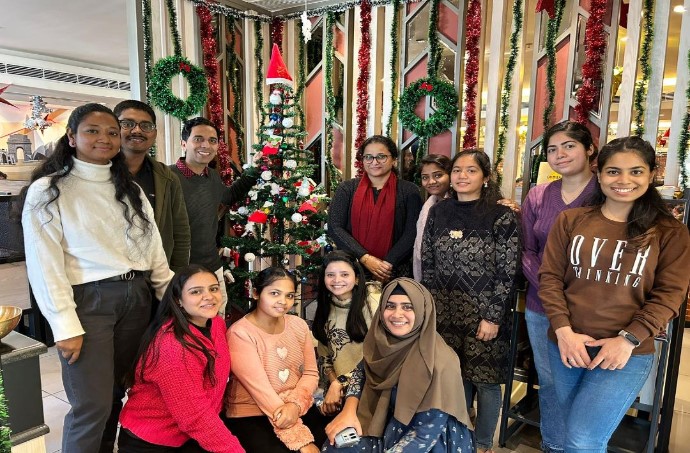
Dr.
Archna Singh
Female
Affiliation
Professor
Department of
Biochemistry
Contact
Email :
arch2574[at]gmail[dot]com
Phone :
011-26593635
26593478
Office Address
Address: Room Nos. 3044 and 3046a,
Department of Biochemistry,
AIIMS, New Delhi.
Academic Details:
| Degree | University | Subject | Year |
|---|---|---|---|
| MBBS | Nalanda Medical College, Patna, India | Medicine, Surgery, Gynecology | 1998 |
| M.D. | All India Institute of Medical Sciences, Delhi, India | Biochemistry | 2004 |
| Ph. D | All India Institute of Medical Sciences, Delhi, India | Biochemistry | 2008 |
| MPH | University of Michigan, Ann Arbor, US | Environmental Health (Nutrition concentration) | 2008 |
Positions held:
| Sr. No. | Position held | Name of Institution/Place | From | To |
|---|---|---|---|---|
| 1 | Professor | All India Institute of Medical Sciences, New Delhi, India. | July 2023 | Present |
| 2 | Additional Professor | All India Institute of Medical Sciences, New Delhi, India. | July 2019 | June 2023 |
| 3 | Associate Professor | All India Institute of Medical Sciences, New Delhi, India. | July 2016 | June 2019 |
| 4 | Assistant Professor. | All India Institute of Medical Sciences, New Delhi, India | Nov 2012 | June 2015 |
| 5 | Assistant Professor | IIPH-D, Public Health Foundation of India, New Delhi, India. | Jan 2009 | Oct 2012 |
| 6 | Senior Resident | All India Institute of Medical Sciences, New Delhi, India | August 2004 | July 2007 |
| 7 | Junior Resident | All India Institute of Medical Sciences, New Delhi, India. | July 2001 | June 2004 |
Society Memberships:
1. Life Member of the Society for Mitochondrial Research and Medicine, India.
2. Life Member, Indian Association for Cancer Research.
3. Life Member of Immunology Society of India.
4. Life member of Association of Medical Biochemists of India
List of Lab members
- Dr.Bhanupriya Awasthi, Postdoctoral Fellow.
- Ms. Sakshi Shukla, Doctoral student.
- Dr.Anudeep P P, Senior demonstrator (Not in pic).
- Dr.Laxmi Pillai, Junior Resident, (Not in pic).
- Ms. Bindiya Jindal, M.Sc. student.
- Ms.Shikha Roy, M.Sc. student.
- Adeeba Malik, Junior Research Fellow.
- Dr. Abishek G, MD student (not in pic).
- Ms. Dolly Rathore, Laboratory Technician.
- Mr.Mudassir Ali, Laboratory Technician.
- Mr.Ram Vikas Yadav, Laboratory Technician.
- Mr.Nidhi Bailwal, Laboratory Technician.
- Megha Suresh, Nutrition Research Associate.
- Sabiha Khan, Senior Nutrition Research Fellow.
Positions Available: Expected in January 2024.
Research Focus of the Lab :
The broad research focus of my laboratory is on different aspects of lipid metabolism in cancer and obesity. Some of our research revolves around the role of ABCA1, involved in lipid efflux, in maintaining adipocyte homeostasis in obesity since we observed a lower gene expression of this transporter in the visceral adipose tissue of obese individuals. We are looking at pathways related to adipocyte ABCA1 and some lipid species like ceramides that could drive insulin resistance in obesity. We have also studied HDL’s function and quality concerning its key physiological roles i.e., in reverse cholesterol transport, antioxidative capacity, endothelial reactivity etc. We aim to understand the implications of changes in the quality of various HDL-associated molecules such as ApoA1 and Sphingosine-1-phosphate. Our cancer research focuses on analysing various aspects of metabolic reprogramming in pediatric B-ALL. We have recently found inter-tumor heterogeneity in the expression of lipid metabolism enzymes like ACSM3, and ACSL1 among pediatric B-ALL cases and we are planning to apply various approaches to understand the biological implications of this differential expression. Other avenues of interest include bioenergetics, mitochondrial biogenesis and factors regulating mitochondrial DNA copy number in leukemia.
The nutrition research in the lab extends into both the biochemical and public health domains in the context of the dietary quality and nutritional status of indigenous tribal communities of India. Our work among these communities encompasses food systems sustainability research and I am a collaborator on a recently awarded Team Science Grant on this theme in which my role is to develop successful diagnostic technologies for micronutrient assessment that can be feasible and cost-effective for assessing micronutrient status in these vulnerable communities. My interest extends to exploring the nutrient profiles of unique indigenous varieties of foods like mushrooms and indigenous rice varieties. We have also recently started work on a collaborative project with the Department of Cardiology and TGI, India for understanding the effect of foods on inflammatory biomarkers among CAD patients.
We are ably supported in our research work by experienced and sincere laboratory technicians. We are an enthusiastic research group, promoting collaborative work with various departments at AIIMS and between Institutes like IGIB and TGI, India. We endeavour to publish and disseminate our work across the global research community.
In keeping with our interest in metabolism, we enjoy experimenting with various cuisines and enjoy varied culinary experiences to rejuvenate ourselves occasionally.
We have a vibrant and enthusiastic team in the lab that is always striving to enhance their academic and extra-curricular skills.
Some Key publications:
- Thakkar H, Vincent V, Roy A and Singh A. Thakkar H, Vincent V, Roy A, Singh A. High density lipoprotein heterogeneity & function among Indians with coronary artery disease. Indian J Med Res. 2023;158(3):292-302. doi:10.4103/ijmr.ijmr_1212_22.
- Sharma G, Tran TM, Bansal I, et al. RNA binding protein IGF2BP1 synergizes with ETV6-RUNX1 to drive oncogenic signaling in B-cell Acute Lymphoblastic Leukemia. J Exp Clin Cancer Res. 2023;42(1):231. Published 2023 Sep 5. doi:10.1186/s13046-023-02810-1.
- Sachan, A, Aggarwal, S, Pol, MM, Singh, A, Yadav, R. Expression analysis of MMP14: Key enzyme action in modulating visceral adipose tissue plasticity in patients with obesity. Clinical Obesity, 2023 e12607. doi:10.1111/cob.12607.
- Bansal A, Singh A, Nag TC, Sharma D, Garg B, Bhatla N, Choudhury SD, Ramakrishnan L. Augmenting the Angiogenic Profile and Functionality of Cord Blood Endothelial Colony-Forming Cells by Indirect Priming with Bone-Marrow-Derived Mesenchymal Stromal Cells. Biomedicines. 2023 May 5;11(5):1372. doi: 10.3390/biomedicines11051372. PMID: 37239042; PMCID: PMC10216643.
- Singh A, Dhasmana A, Bandhu A, Kapoor R, Baalasubramanian S, Ghosh-Jerath S. Contribution of natural food environments to nutritional intake and biomarker status: insights from the women of indigenous santhal communities of Jharkhand, India. BMC Nutr. 2023 Jan 27;9(1):20. doi: 10.1186/s40795-023-00669-1. PMID: 36707902; PMCID: PMC9881317.
- Singh A, Baalasubramanian S, Kalaivani M, Kapoor R, Bhagwat K, Ghosh-Jerath S. Standardisation and application of a novel multiplex assay for estimating micronutrient status and inflammatory markers in women of Sauria Paharia and Santhal tribes of Jharkhand. Br J Nutr. 2022:1-16. doi: 10.1017/S0007114522000320.
- Sen A, Singh A, Roy A, Mohanty S, Naik N, Kalaivani M, Ramakrishnan L. Role of endothelial colony forming cells (ECFCs) Tetrahydrobiopterin (BH4) in determining ECFCs functionality in coronary artery disease (CAD) patients. Sci Rep. 2022;12(1):3076. doi: 10.1038/s41598-022-06758-8. PMID: 35197509.
- Singh R, Jain A, Palanichamy JK, Nag TC, Bakhshi S, Singh A. Ultrastructural changes in cristae of lymphoblasts in acute lymphoblastic leukemia parallel alterations in biogenesis markers. Appl Microsc. 2021 Dec 29;51(1):20. doi: 10.1186/s42649-021-00069-4. PMID: 34964922.
- Sachan A, Singh A, Shukla S, Aggarwal S, Mir I, Yadav R. An immediate post op and follow up assessment of circulating adipo-cytokines after bariatric surgery in morbid obesity. Metabol Open. 2021 Nov 1;13:100147. doi: 10.1016/j.metop.2021.100147. PMID: 34993466; PMCID: PMC8713110.
- Thakkar H, Vincent V, Roy A, Gautam AK, Kutum R, Ramakrishnan L, Singh S, Singh A. Determinants of high-density lipoprotein (HDL) functions beyond proteome in Asian Indians: exploring the fatty acid profile of HDL phospholipids. Mol Cell Biochem. 2021. doi: 10.1007/s11010-021-04304-0. Epub ahead of print. PMID: 34843015.
- Thakkar H, Vincent V, Shukla S, Sra M, Kanga U, Aggarwal S, Singh A. Improvements in cholesterol efflux capacity of HDL and adiponectin contribute to mitigation in cardiovascular disease risk after bariatric surgery in a cohort with morbid obesity. Diabetol Metab Syndr. 2021 Apr 17;13(1):46. doi: 10.1186/s13098-021-00662-3. PMID: 33865458; PMCID: PMC8053301.
- Thakkar H, Vincent V, Sen A, Singh A, Roy A. Changing Perspectives on HDL: From Simple Quantity Measurements to Functional Quality Assessment. J Lipids. 2021 Apr 26;2021:5585521. doi: 10.1155/2021/5585521. PMID: 33996157; PMCID: PMC8096543.
- Ghosh-Jerath S, Kapoor R, Singh A, Downs S, Barman S, Fanzo J. Leveraging Traditional Ecological Knowledge and Access to Nutrient-Rich Indigenous Foods to Help Achieve SDG 2: An Analysis of the Indigenous Foods of Sauria Paharias, a Vulnerable Tribal Community in Jharkhand, India. Front Nutr. 2020 Jun 2;7:61. doi: 10.3389/fnut.2020.00061. PMID: 32582750; PMCID: PMC7280452.
- Thakkar H, Vincent V, Roy A, Singh S, Ramakrishnan L, Kalaivani M, Singh A. HDL functions and their interaction in patients with ST elevation myocardial infarction: a case control study. Lipids Health Dis. 2020 Apr 15;19(1):75. doi: 10.1186/s12944-020-01260-4. PMID: 32293456; PMCID: PMC7158160.
- Vincent V, Thakkar H, Verma A, Sen A, Chandran N, Singh A. A novel flow cytometry-based quantitative monocyte adhesion assay to estimate endothelial cell activation in vitro. Biotechniques. 2020;68(6):325-333. doi:10.2144/btn-2019-0169. PMID: 32283953.
- Ghosh-Jerath S, Downs S, Singh A, Paramanik S, Goldberg G, Fanzo J. Innovative matrix for applying a food systems approach for developing interventions to address nutrient deficiencies in indigenous communities in India: a study protocol. BMC Public Health. 2019;19(1):944. doi:10.1186/s12889-019-6963-2. PubMed PMID: 31307415.
- Tyagi A, Pramanik R, Bakhshi R, Singh A, Vishnubhatla S, Bakhshi S. Expression of mitochondrial genes predicts survival in pediatric acute myeloid leukemia. Int J Hematol. 2019 Aug;110(2):205-212. doi: 10.1007/s12185-019-02666-2.
- Vinnyfred Vincent, Himani Thakkar, Sandeep Aggarwal, Asit Mridha, Lakshmy Ramakrishnan, Archna Singh. ATP binding cassette transporter A1 (ABCA1) expression in adipose tissue and its modulation with insulin resistance in obesity. Diabetes Metab Syndr Obes. 2019; 12:275-284. doi: 10.2147/DMSO.S186565.
- Suparna Ghosh-Jerath, Archna Singh, Tanica Lyngdoh, Melina S Magsumbol, Preeti Kamboj, Gail Goldberg. Estimates of indigenous food consumption and their contribution to nutrient intake in Oraon tribal women of Jharkhand, India. Food and Nutrition Bulletin. 2018 Dec;39(4):581-594. doi: 10.1177/0379572118805652.
- Tyagi A, Pramanik R, Vishnubhatla S, Ali S, Bakhshi R, Chopra A, Singh A, Bakhshi S. Pattern of mitochondrial D-loop variations and their relation with mitochondrial encoded genes in pediatric acute myeloid leukemia. Mutat Res. 2018 Jul;810:13-18. doi: 10.1016/j.mrfmmm.2018.05.002.
- Jain A, Bakhshi S, Thakkar H, Gerards M, Singh A. Elevated mitochondrial DNA copy numbers in pediatric acute lymphoblastic leukemia: A potential biomarker for predicting inferior survival. Pediatr Blood Cancer. 2018;65(3). doi: 10.1002/pbc.26874.
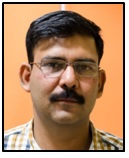
Dr.
Sudip Sen
Male
Affiliation
Professor
Department of
Biochemistry
Contact
Email :
sudipsen665[at]gmail[dot]com
Phone :
+91-11-2659-4945
Office Address
Address: Room No. 3027A, Department of Biochemistry, AIIMS, New Delhi - 110029
Academic Details :
| Degree | Subject | University/ Institution | Year |
|---|---|---|---|
| Ph.D. | Biochemistry | AIIMS, New Delhi | 2007 |
| M.D. | Biochemistry | AIIMS, New Delhi | 2002 |
| M.B.B.S. | N.A. | N.R.S. Medical College, Calcutta | 1995 |
Positions held
| Position | Department | University/ Institution | Dates |
|---|---|---|---|
| Professor | Biochemistry | AIIMS, New Delhi | 2022 – till date |
| Additional Professor | Biochemistry | AIIMS, New Delhi | 2018 – 2022 |
| Associate Professor | Biochemistry | AIIMS, New Delhi | 2015 – 2018 |
| Assistant Professor | Biochemistry | AIIMS, New Delhi | 2012 – 2015 |
| Assistant Professor | Biochemistry | UCMS, Delhi | 2009 – 2012 |
| DST Fast Track Fellow | Biochemistry & Ophthalmology | AIIMS, New Delhi | 2006 – 2009 |
Notable Awards and Society Memberships:
- Member of National Academy of Medical Sciences (MNAMS) 2014.
- Member of
- (a) Society for Neurosciences (SfN)
- (b) Federation of European Neuroscience Societies (FENS)
- (c) International Society for Stem Cell Research (ISSCR)
- (d) Indian Academy of Neurosciences (IAN)
- (e) Indian Association for Cancer Research (IACR)
- (f) AMBI and ACBI
- (g) Delhi Medical Association
List of Lab members:
Currently enrolled Ph.D. scholars:
- Mr. Sagar Tyagi, MSc
- Dr. Vadanya Shrivastava, MD
M.D. student:
- Dr. Rajkumar Mandal
- Dr. Sona Fazil
Staff:
- Mrs. Amrita Sachdeva (Admn.)
- Mr. Pramod Kumar (Lab attendant)
- Mr. Avdesh Kumar (Project staff)
Lab alumni:
- Dr. Janvie Manhas, MD, PhD
- Dr. Devanjan Dey, PhD
- Dr. Aditi Bhattacharya, PhD
- Dr. Amarpreet Kaur, MD, PhD
- Dr. Sandeep K. Agrawal, MD
- Dr. Janvie Manhas, MD
- Dr. Pradeep Jingar, MD
- Dr. Vadanya Shrivastava, MD
- Dr. Pawan Pagaku
- Ms. Nupur Khera, MSc
- Ms. Sumedha Saluja, MSc
- Ms. Diksha Joshi, MSc
- Ms. Sweety Rani Goyal, MSc
Positions Available: Contact by email to get the latest information.
Research Focus of the Lab
We have developed an in-vitro model of cerebral palsy using fetal neural stem cells (FNSCs), in collaboration with NBRC, Manesar. This model is helping us identify the changes that occur during the disease process, and determine better ways by which we can prevent/treat cerebral palsy.
Recent publications:
- Dey D, Shrivastava V, Joshi D, Singal CMS, Tyagi S, Bhat MA, Jaiswal P, Sharma JB, Palanichamy JK, Sinha S, Seth P, Sen S. Hypoxia induces early neurogenesis in human fetal neural stem cells by activating the WNT pathway. Molecular Neurobiology, Feb 2023 (doi: 10.1007/s12035-023-03248-4).
- Pruthi G, Rawat P, Sen S, Jain V. Effect of soft liner on masticator efficiency and bite force in first time complete denture wearers: a crossover clinical study. Accepted in International Journal of Prosthodontics and Restorative Dentistry, Feb, 2023.
- Manhas J, Lohani LR, Seethy A, Kumar U, Gamanagatti S, Sen S. Case report: Characterization of a rare pathogenic variant associated with loss of COL3A1 expression in vascular Ehlers Danlos syndrome. Frontiers in Cardiovascular Medicine, October, 2022. doi: 10.3389/fcvm.2022.939013.
- Sarangi J, Ahmad A, Sulaiman M, Ghosh S, Gupta B, Panwar R, Pal S, Yadav R, Ahuja V, Sen S, Upadhyay AD, Dash NR, Gupta SD, Das P. Methylation study of tumor suppressor genes in Human Aberrant Crypt Foci, Colorectal Carcinomas, and Normal Colon. Accepted in Journal of Cancer Research and Therapeutics, September, 2022.
- Aryal A, Pagaku PK, Dey D, Tyagi S, Shrivastava V, Bhattacharya A, Rani S, Nayak D, Khurana A, Khanna P, Goyal A, Mridha AR, Garg B, Sen S. Protocol for developing a femur osteotomy model in Wistar albino rats. Journal of Visualized Experiments, Aug 2022; e63712. doi.org/10.3791/63712.
- Shrivastava V, Dey D, Singal CMS, Jaiswal P, Singh A, Sharma JB, Chattopadhyay P, Nayak NR, Palanichamy JK, Sinha S, Seth P, Sen S. Glutamate uptake is not impaired by hypoxia in a culture model of human fetal neural stem cell-derived astrocytes. Genes, 2022; 13(3): 506. doi.org/10.3390/genes13030506
- Bhattacharya A, Saluja S, Managuli V, Agrawal S, Dey D, Garg B, Ansari MT, Roy S, Sen S. Comparing migratory and mechanical properties of human bone marrow-derived mesenchymal stem cells with colon cancer cells in vitro. J Gastrointest Cancer, 2021 Sep;52(3):882-891. doi: 10.1007/s12029-020-00476-y.
- Dey D, Jingar P, Agrawal S, Shrivastava V, Bhattacharya A, Manhas J, Garg B, Ansari MT, Mridha AR, Sreenivas V, Khurana A, Sen S. Symphytum officinale augments osteogenesis in human bone marrow-derived mesenchymal stem cells in vitro as they differentiate into osteoblasts. J Ethnopharmacology, 2020 Feb 10;248:112329. doi: 10.1016/j.jep.2019.112329

Dr.
Kunzang Chosdol
Others
Affiliation
Professor
Department of
Biochemistry
Contact
Email :
kunzangchosdol[at]yahoo[dot]com
Phone :
91-11-26549235
Address: Room no 4007,
4th Floor, Convergence Block,
Department of Biochemistry,
All India Institute of medical Sciences, New Delhi
Academic Details
| Degree | Subject | University/ Institution | Year |
|---|---|---|---|
| PhD | Biochemistry | AIIMS, New Delhi | 2007 |
| MD | Biochemistry | AIIMS, New Delhi | 1999 |
| MBBS & Internship | Medicine | Bundhelkhand University, Jhansi, UP | 1995 |
Positions held:
| Position | Department | University/ Institution | Dates |
|---|---|---|---|
| Professor | Biochemistry | All India Institute of Medical Science, New Delhi | 2014- Till date |
| Additional Professor | Biochemistry | All India Institute of Medical Science, New Delhi | 2010-2014 |
| Associate Professor | Biochemistry | All India Institute of Medical Science, New Delhi | 2007-2010 |
| Assistant Professor | Biochemistry | All India Institute of Medical Science, New Delhi | 2003-2007 |
| Senior Demonstrator | Biochemistry | All India Institute of Medical Science, New Delhi | 2000-2003 |
Notable Awards and Society Memberships
- AIIMS Excellence Research Award- 2015 (3rd Prize) in recognition of the outstanding publication “A combined gene signature of hypoxia and Notch pathway in human glioblastoma and its prognostic relevance”
- ISNO Presidents Award -2014 for the best Clinician Researcher in Basic Neuro-Oncology, awarded during 6th Annual Conference of the Indian Society of neuro-Oncology (11-13 April, 2014) at Lucknow.
- AIIMS Excellence Research Award-2013(Third prize) in recognition of the outstanding publication “FAT1 acts as an upstream regulator of oncogenic and inflammatory pathways, via PDCD4, in glioma cells”.
- DSTFAST TRACK Scheme for Young Scientist: 2010 and 2003.
- International Travel Grant from AIIMS to present my work in conference -IXth European Congress of Neuropathology, Greece. May, 2008
- INSA (Indian National Science Academy) Travel Support to attend the conference -IXth European Congress of Neuropathology, Greece. May, 2008
- Travel Fellowship by the MNBWS organizers (USA) to present my work during symposium - MNBWS; 50 years on: From the Double helix to Molecular Medicine, Miami, Florida. 2003.
- CSIR International Travel Grant to present my work in a symposium - MNBWS; 50 years on: From the Double helix to Molecular Medicine, Miami, Florida. 2003.
Patents:
1. Indian Patent Application No. 1400/DEL/2013: Sinha S, Khan I, Zakaria MK, Chosdol K, Chattopadhyay P for the invention entitled “Placental like Alkaline Phosphatase (PLAP) Promoter Mediated Cell Targeting”
2. Indian patent, PCT-1282 (PCT/IB2013/05008): Chosdol K, Dikshit B and Sinha S: For the “Use of FAT1 gene and its products including RNA, protein and the derivatives of the same, as suitable molecules for either inflammation or cancer and the associated phenotype and the processes linking the same and also as a biomarker for the above processes”. International patent filed, PCT in process.
Society Memberships:
- National Academy of Medical Sciences (NAMS)
- Indian Association for Cancer Research (IACR)
- Vice-President (2016-2018)
- ― Treasurer (2014-2016)
- Indian Society for NeuroOncology (ISNO)
- Association of Clinical Biochemists of India (ACBI)
- Society for NeuroChemistry India (SNCI)
1.Dr. Khushboo Irshad, PhD - DST-SERB Young Scientist
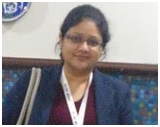
Dr. Khushboo Irshad completed her PhD at the Department of Biochemistry, AIIMS, New Delhi, in 2013 under the supervision of Prof. Kunzang Chosdol, Prof. Subrata Sinha and Prof. P. Chattopadhyay. Her thesis involved the study of correlation between hypoxia and Notch signaling pathway in glioblastoma and identification of a combined gene signature to predict the survival of glioblastoma patients. Her work derived a key prognostic molecular cluster characteristic of the Notch pathway response in hypoxic glioblastoma tumors and gliomasphere cultures (PLoS One (2015); 10(3):e0118201; felicitated with AIIMS Excellence Research Award-2015 that was awarded to Prof. Chosdol). Presently, her research focuses on deciphering the role of FAT1, a novel gene implicated in glioma, in regulating the hallmark features of glioma like stemness and invasiveness, as well as in maintenance of the balance between pro-inflammatory and anti-inflammatory signaling in glioma. She was awarded the DST-SERB Start-Up Research Grant in March 2016, for the project aimed at elucidation of FAT1 function in modulating pro-inflammatory signaling and anti-inflammatory / immunosuppressive signaling pathways in glioma.
2.Dr. SRINIVAS H, MD,DNB (PhD)
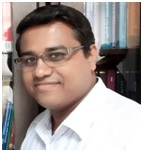
Dr. Srinivas H done MBBS from Bangalore Medical college, Rajiv gandhi university of health sciences Karnataka and MD from MAULANA AZAD Medical College, Delhi university, New Delhi. His MD thesis was on procalcitonin, IL 6, TNFalpha and urinary isoprostane in sepsis patients under the guidance of ex HOD and director professor Dr TK Mishra. He has completed one year of senior residency in PGIMER, Chandigarh and two year of senior residency in AIIMS, New Delhi. He has published his work in national and international papers in the various field of sciences and medical education. He is working now on pathway analysis of interaction between FAT1 with p53, HIF 1alpha and beta catenin in glioma as a PhD research scholar under the guidance of Dr KUNZANG CHOSDOL and Dr SUBRATA SINHA. He has done DNB from Diplomate of National Board in biochemistry and certification course in industry program, clinical trials and administration from bioinformatics institute of India. He is a Life member of Association of Medical Biochemistry of India since 2008
Life member of Society for Tissue Engineering and Regenerative Medicine (India), Thiruvananthapuram since 2010 and Indian Association of Cancer Research.
3.Ms. Chitrangda Srivastava - PhD scholar
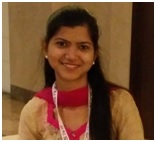
Ms. Chitrangda Srivastava is currently in her final year of PhD. She is working on the characterization of FAT1 gene promoter. In addition, she is analyzing the functional role of FAT1 with EMT and stemness in hypoxic glioma. She completed her M.Sc. from the department of Biochemistry, AIIMS, in 2012. Her M.Sc. thesis involved the study of the role of Notch signalling pathway with EMT and stemness in pathogenesis of glioma under hypoxia. She has won several awards during her PhD tenure, including Best Oral Presentation Award in ACOS-2016, European Young Scientist Travel Award-2015, G.P. Talwar Foundation Travel Award-2015, etc. She is an Associate Member of the American Association of Cancer Research since 2011 and an Associate Member of the European Society of Neuro-Oncology since 2016.
4.Nargis Malik, PhD. Scholar
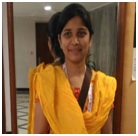
Nargis Malik completed her M.Sc. in toxicology from Meerut University, Currently she is a second year PhD. student working on the “Role of FAT1 gene on the regulation of microRNAs in glioma”
5.Ms. AKANKSHA KANOJIA, M.Sc. student
Akanksha Kanojia has completed her B.Sc.(H) in Biomedical Sciences from Acharya Narendra Dev College, University of Delhi in 2016. She is currently pursuing M.Sc. in Biochemistry from All India Institute of Medical Science, Delhi under the guidance of Dr. Kunzang Chosdol.
Mukesh Kumar (Laboratory Attendant Gr. II)
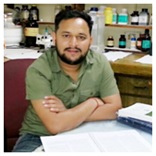
Mukesh Kumar is working as a Laboratory Attendant Gr.-II in the Department of Biochemistry since August 2011. He help in the research related work for M.Sc., Ph.D. and M.D. Students in Research Laboratory of Dr. Parthaprasad Chattopadhyay & Dr. Kunzang Chosdol. His nature of duties includes, culture work, DEPC treatment and assistance of UG/PG examination.
Research Focus of the Lab :
- Study of the role of the FAT1 gene in human glial tumorigenesis: We had identified the FAT1 gene (A Human Homologue of Drosophila Tumor Suppressor Gene fat) and its involvement in human glial tumors. Using RAPD-PCR technique, we have identified a consistently altered locus of chromosome 4q34-q35 which was found to be altered in ~ 50% of the tumors studied. We observed high LOH at the same locus. Our study is the first report of the involvement of FAT1 gene in glioma (BMC Cancer, 2009;9:5). On functional study in cell lines, we found FAT1 to have an oncogenic role in glioma. On knocking down of FAT1 expression by siRNA system in glioma cell lines, we found decreased cell migration and invasion, and decreased expression of various inflammatory modulators like COX2, IL1β, IL6 etc. FAT1 is found to be acting as an apical regulator acting via JNK/AP1 pathway for mediating both cancer cell migration & invasion as well as regulating the expression of various inflammatory modulators in glioma cells. Ours is the first report showing a novel role of FAT1 in regulating both cancer and inflammation in glioma (Oncogene, 2013;32:3798-808). A positive correlation between FAT1, HIF1α, EMT and stemness markers expression has been observed in GBM tumor samples as well as in glioma cell lines maintained under severe hypoxia. A novel role of FAT1 in positively regulating HIF1α via EGFR/AKT/mTOR signalling pathway in hypoxic glioma cell lines has been detected (IJC, 2016, Aug).
- Study of the role of Notch signaling under hypoxia in Glioblastoma: We analyzed the molecular link between the hypoxia markers and the Notch signaling molecules in primary GBM by real time PCR and analyzed their correlation. A molecular signature of hypoxia and Notch genes has been identified indicating the prognostic status of GBM patients (PLoS ONE, 2015;10(3):e0118201).
- Heterozygosity status of 1p and 19q and its correlation with p53 protein expression and EGFR amplification in patients with astrocytic tumors (Cancer Genet Cytogenet. 2010, 198,126-34). Have conducted research on the role of recombinogenic sequences on the genomic fluidity in gliomas (Mutation Research, 2001, 484: 53-59) and mutator hypothesis (BMC Cancer, 2007,7:190). We have also shown the role of alu mediated recombination in generating genomic instability under sublethal cytotoxic pressure, a possible mechanism of drug resistance (Int J Cancer, 2005;117:683. Cover Page Article).
- Another aspect of our work is to look at genetic polymorphism in ethnic groups and also their linkage with disease states. The status of p53 codon 72 for Arginine/proline allele polymorphisms in different ethnic groups (Ladakhi, Kashmiri, Punjabi, Rajasthani Gujjar and Rajasthani Rajput) in North India was studied by PCR-RFLP technique. We found significantly increased frequency of Argnine allele in the Ladakhi population only. The results indicates that HPV induced cervical carcinoma has no effect on the inheritance of this supposed “susceptibility” allele (Curr. Sci. 2002, 82;1253. Cover page article). We are studying the polymorphisms in folate metabolizing enzymes and their correlation with the levels of homocysteine, folate and Vitamin B12 in normal as well as glioma patients.
- We have collaborated in the following studies:
- The role of β-catenin/WNT signalling in the pathogenesis of eyelid sebaceous cell carcinoma (SbCC). Epigenetic inactivation could contribute to the reduced disease-free survival in eyelid sebaceous gland carcinoma (Br J Ophthalmol, 2011;95:284, Br J Dermatol, 2012;167:583,Br J Dermatol, 2015;173:811).
- The ionotropic glutamate receptor kainate3 (GRIK3) Ser310Ala (T928G) polymorphism and schizophrenia in the Indian population. We, for the first time, showed the prevalence of this polymorphism and its association with schizophrenia in the Indian population (World J Biol Psychiatry. 2009, 10:330-3).
- The promoter methylation status of MGMT (O6-methylguanine–DNA methyltransferase) gene and benefit from Temozolomide in Glioblastoma patients (Neurosurgery 2010;67:1681-91), analyzed microsatellite markers on chromosome 1p and 19q in gliomas especially Oligodendrogliomas (Cancer Genet Cytogenet. 2010, 198:126-34, DiagnMolPathol, 2011;20:40-7).
Recent publications:
- Madan E, Dikshit B, Gowda SH, Srivastava C, Sarkar C, Chattopadhyay P, Sinha S, Chosdol K (2016) FAT1 is a novel upstream regulator of HIF1α and invasion of high grade glioma. Int J Cancer. 2016 Aug 18. doi: 10.1002/ijc.30386. [Epub ahead of print]
- Jalota A, Kumar M, Das BC, Yadav AK, Chosdol K, Sinha S (2016) Synergistic increase in efficacy of a combination of 2-deoxy-D-glucose and cisplatin in normoxia and hypoxia: switch from autophagy to apoptosis. Tumour Biol. 2016 Jun 15. [Epub ahead of print]
- Bhardwaj M, Sen S, Sharma A, Kashyap S, Chosdol K, Pushker N, Bajaj MS, Bakhshi S (2015) ZEB2/SIP1 as novel prognostic indicator in eyelid sebaceous gland carcinoma. Hum Pathol. 2015 Oct;46(10):1437-42
- Irshad K, Mohapatra SK, Srivastava C, Garg H, Mishra S, Dikshit B, Sarkar C, Gupta D, Chandra PS, Chattopadhyay P, Sinha S, Chosdol K (2015) A Combined Gene Signature of Hypoxia and Notch Pathway in Human Glioblastoma and Its Prognostic Relevance. PLoS One. 2015 Mar 3;10(3):e0118201
- Jayaraj P, Sen S, Sharma A, Chosdol K, Kashyap S, Rai A, Pushker N, Bajaj M. (2015) Eyelid sebaceous carcinoma: a novel mutation in lymphoid enhancer-binding factor 1 (LEF1). Br J Dermatol. 2015 Sep;173(3): 811-4
- Chingkheilemba M, Kumar U, Chosdol K, Das N (2014). Lack of role of endothelial nitric oxide synthase gene Glu298Asp polymorphism in rheumatoid arthritis among Asian Indians. IOSR Journal of Dental and Medical Sciences (IOSR-JDMS) 2014; 13(4): 25-28.
- Dikshit B, Irshad K, Madan E, Aggarwal N, Sarkar C, Chandra PS, Gupta DK, Chattopadhyay P, Sinha S, Chosdol K (2013). FAT1 acts as an upstream regulator of oncogenic and inflammatory pathways, via PDCD4, in glioma cells. Oncogene. 2013 Aug 15;32(33):3798-808.
- Agarwal S, Sharma MC, Jha P, Pathak P, Suri V, Sarkar C, Chosdol K, Suri A, Kale SS, Mahapatra AK, Jha P (2013). Comparative study of IDH1 mutations in gliomas by immunohistochemistry and DNA sequencing. Neuro Oncol. 2013 Jun;15(6):718-26.
- Chosdol K, Misra A, Puri S, Srivastava T, Sarkar C, Mahapatra AK and Sinha S (2009) Frequent LOH and altered expression of tumor supressor FAT identified by RAPD in astrocytic tumors. BMC Cancer 9:5
- Srivastava T, Chosdol K, Chattopadhyay P, Mahapatra AK, Sarkar C, Sinha S (2007) Frequent loss of heterozygosity encompassing the hMLH1 locus in low grade astrocytic tumors. J Neuro-oncol. Feb;81(3):249-55.
Research Funding Agencies: DST; DRDO; DBT; IMRG (AIIMS).
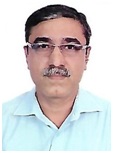
Dr.
Parthaprasad Chattopadhyay
Male
Affiliation
Professor
Department of
Biochemistry
Contact
Email :
parthoaiims[at]hotmail[dot]com
Phone :
011-26549238
Address : Room No. 4007, Convergence Block, AIIMS, New Delhi.
EDUCATION
MBBS, (1981-1987) R G Kar Medical College, Calcutta University, Kolkata
MD, Biochemistry, (1989-1991) All India Institute of Medical Sciences, New Delhi.
PhD, Biochemistry (1992-1996) All India Institute of Medical Sciences, New Delhi.
PROFESSIONAL EXPERIENCE
Senior Demonstrator (1992-1995) Department of Biochemistry, AIIMS, New Delhi
Assistant Professor (1997-2003) Department of Biochemistry, AIIMS, New Delhi
Associate Professor (2003-2007) Department of Biochemistry, AIIMS, New Delhi
Additional Professor (2007-2011) Department of Biochemistry, AIIMS, New Delhi
Professor (2011- till date) Department of Biochemistry, AIIMS, New Delhi
Present Team
- PhD Students
- Neha Singh: Ritika Singh:
- MD student: Dr. Abhishek Mishra
Research Focus of the Lab
a) Nanoparticle trafficking within the cell: Tracing the path of nanoparticles within the cell and attempting to modulate their intracellular travel to prolong their stay within the cell for increased unloading of their cargo (drug).
b) Site-directed epigenetic modulation: Using modified CRISPR based techniques to modulate CpG methylation and Histone methylation/acetylation for altering gene expression of tumor suppressor and promoter genes
Strategic publications
- Passive internalization and active extrusion determines PLGA-nanoparticle concentration in cancer cell lines. Baidya G, Tiwary R, Mudassir M, Singh N, Saha S, Chosdol K, Sinha S, Chattopadhyay P..Nanomedicine (Lond). 2020 Aug;15(23):2229-2239.
- HIF-2α mediates a marked increase in migration and stemness characteristics in a subset of glioma cells under hypoxia by activating an Oct-4/Sox-2-Mena (INV) axis. Bhagat M, Palanichamy JK, Ramalingam P, Mudassir M, Irshad K, Chosdol K, Sarkar C, Seth P, Goswami S, Sinha S, Chattopadhyay P..Int J Biochem Cell Biol. 2016 May;74:60-71.
- A novel placental like alkaline phosphatase promoter driven transcriptional silencing combined with single chain variable fragment antibody based virosomal delivery for neoplastic cell targeting. Khan I, Zakaria MK, Kumar M, Mani P, Chattopadhyay P, Sarkar DP, Sinha S..J Transl Med. 2015 Aug 5;13:254.
- Gene Silencing and Activation of Human Papillomavirus 18 Is Modulated by Sense Promoter Associated RNA in Bidirectionally Transcribed Long Control Region. Kassab MA, Mudassir M, Singh A, Bhagat M, Palanichamy JK, Ramalingam P, Chosdol K, Sinha S, Chattopadhyay P..PLoS One. 2015 Jun 5;10(6):e0128416.
- Biogenesis of intronic miRNAs located in clusters by independent transcription and alternative splicing. Ramalingam P, Palanichamy JK, Singh A, Das P, Bhagat M, Kassab MA, Sinha S, Chattopadhyay P. RNA. 2014 Jan;20(1):76-87.
- Combination of hepatocyte specific delivery and transformation dependent expression of shRNA inducing transcriptional gene silencing of c-Myc promoter in hepatocellular carcinoma cells. Zakaria MK, Khan I, Mani P, Chattopadhyay P, Sarkar DP, Sinha S..BMC Cancer. 2014 Aug 10;14:582. doi: 10.1186/1471-2407-14-582.
- Long-term suppression of HIV-1C virus production in human peripheral blood mononuclear cells by LTR heterochromatization with a short double-stranded RNA. Singh A, Palanichamy JK, Ramalingam P, Kassab MA, Bhagat M, Andrabi R, Luthra K, Sinha S, Chattopadhyay P..J Antimicrob Chemother. 2014 Feb;69(2):404-15.
- CpG hypermethylation of the C-myc promoter by dsRNA results in growth suppression. Mehndiratta M, Palanichamy JK, Pal A, Bhagat M, Singh A, Sinha S, Chattopadhyay P..Mol Pharm. 2011 Dec 5;8(6):2302-9.
- Silencing of integrated human papillomavirus-16 oncogenes by small interfering RNA-mediated heterochromatization.Palanichamy JK, Mehndiratta M, Bhagat M, Ramalingam P, Das B, Das P, Sinha S, Chattopadhyay P..Mol Cancer Ther. 2010 Jul;9(7):2114-22.
- Aberrant methylation and associated transcriptional mobilization of Alu elements contributes to genomic instability in hypoxia. Pal A, Srivastava T, Sharma MK, Mehndiratta M, Das P, Sinha S, Chattopadhyay P..J Cell Mol Med. 2010 Nov;14(11):2646-54..
Funding Agencies
Department of Biotechnology and Department of Science & Technology, Ministry of Science & Technology, GOI.

Dr.
Veena Koul
Female
PhD
Affiliation
Professor
Department of
Biomedical Engineering
Contact
Email :
veenak[at]cbme[dot]iitd[dot]ac[dot]in
Phone :
+91-11-2659-1041 (O)/6132/ 6396 (PA)
Additional Responsibility
Biomedical nanotechnology ,Biomaterials, Medical Devices, Soft Tissue regeneration and Drug Delivery Systems

Dr.
Biswarup Mukherjee
Male
PhD
Affiliation
Assistant Professor
Department of
Biomedical Engineering
Contact
Email :
bmukherjee[at]cbme[dot]iitd[dot]ac[dot]in
Additional Responsibility
Ultrasound imaging, Bioinstrumentation, Biomechatronics, Prosthetics and Rehabilitation, Haptics






